Translate:

EN
Translate:

EN
Signed in as:
filler@godaddy.com
Project HOPEhttps://www.projecthope.org › News & Stories4 days ago — Project HOPE's Emergency Response Team is on the ground providing critical health and humanitarian relief to the most affected communities. Read ...
Valentine's Day, celebrated annually on February 14, is a festival of romantic love, friendship, and admiration, marked by exchanging cards, flowers, and gifts, with origins linked to ancient Roman festivals and Christian martyrs, evolving into a day for expressing affection to partners, family, and friends.
What is it?

Best Electric Razors For Women In 2026, Per Derms

Best Laser Hair Removal Devices For Hair-Free Skin

How To Cope With Health Anxiety, Per Psychologists
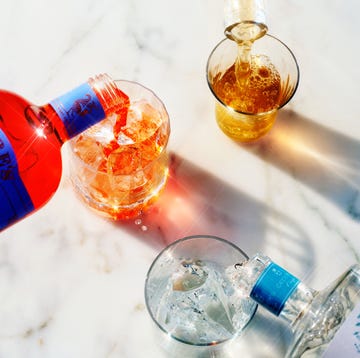
Learn To Drink Less With These 6 Tips

Orthorexia, A Form Of Disordered Eating, Is Rising

Disordered Eating Vs. Eating Disorders, Explained

How To Try The 'Cognitive Shuffling' Sleep Hack

What Type Of Noise Is Best For Sleep? MDs Weigh In
How To Build The Best Self-Care Routine For You

The 6 Best Weighted Sleep Masks of 2025

8 Best Silk Sheet Sets Of 2025, Per Users & Expert
‘I Tried Float Therapy And Walked Out Stress-Free’
EN-GBR
Tahitian Noni® OriginalThe Original Superfruit*£35.20Subscribe & Save
Day & Night DropsTwo Cutting-Edge Blends£131.07Subscribe & Save
EverGlow*Glow With Confidence*£67.03Subscribe & Save
You are shopping with Alan Hoffman
wellbeing online 24/7 vintage saturdays - Alan Hoffman
bringthatcome@nonisolutions.com
more reggae
https://nonisolutions.com/music-%26-entertainment
Harness your passion for wellness to make an impact in people wellbeing
Energy and Alertness
Weight Management
Digestive Health
Antioxidant Properties
Other Potential Benefits:Kola nuts have also been associated with other potential benefits, such as reduced fatigue and hunger, and may be used in traditional medicine for various ailments.
 BISSEY HERBAL TEA IS AVAILABLE NOW
BISSEY HERBAL TEA IS AVAILABLE NOWhttps://nonisolutions.com/wellness-products/ols/products/bissey-herb
We have offered suggestions in the form of videos that you may find helpful in achieving Wellness in your Life and style choices & personal wellbeing needs .
we hope you will both enjoy and find the subject matters beneficial to your own personal wellbeing.
*THINGS THAT MATTERS TO YOU !
☎️. +44 7552 414 744
WELLBEING ONLINE 24/7
In an interview with Sky News's Ed Conway, Sir Jim Ratcliffe says Britain faces profound political, social and economic challenges, among them an unprecedented rise in immigration in recent years; Warning: Please be aware the language below could cause offence
By Ed Conway, Sky News' economics and data editor
Wednesday 11 February 2026 21:54, UK
Please use Chrome browser for a more accessible video player
Man Utd co-owner Sir Jim Ratcliffe on immigration in the UKSir Jim Ratcliffe speaks on immigration in the UK. Manchester United have been contacted for comment.ReplayMuteCurrent Time 3:33/Duration 3:33 CaptionsPicture in pictureFullscreenShareSir Jim Ratcliffe speaks on immigration in the UK. Manchester United have been contacted for comment.
Britain has been "colonised" by immigrants, who are draining resources from the state, Manchester United part-owner Sir Jim Ratcliffe has told Sky News.
Ratcliffe, the founder of the INEOS chemicals group, warned Britain faces profound political, social and economic challenges, among them an unprecedented rise in immigration in recent years.
"You can't have an economy with nine-million people on benefits and huge levels of immigrants coming in," he said. "I mean, the UK has been colonised. It's costing too much money.
"The UK has been colonised by immigrants, really, hasn't it? I mean, the population of the UK was 58 million in 2020, now it's 70 million. That's 12 million people."
However, the Office of National Statistics (ONS) estimates the population of the UK was 67 million in mid-2020 and 70 million in mid-2024. The UK population was estimated at 58.9 million in 2000.
Sky Sports News has contacted Manchester United and Kick It Out for comment. The Premier League did not wish to comment when approached by Sky Sports News on Wednesday evening.
Ratcliffe - who is a resident of Monaco - also signalled Prime Minister Keir Starmer might not be the right person for the job, saying: "I don't know whether it's just the apparatus that hasn't allowed Keir to do it or he's maybe too nice. I mean, Keir is a nice man.
"I like him, but it's a tough job and I think you have to do some difficult things with the UK to get it back on track, because at the moment I don't think the economy is in a good state."
Ratcliffe said he had met recently with Nigel Farage, the leader of right-wing party Reform UK, saying: "I think Nigel is an intelligent man and I think he's got good intentions.
"But in a way, you could say exactly the same about Keir Starmer. I think it needs somebody who's prepared to be unpopular for a period of time to get the big issues sorted out."
Referring to his role at United, Ratcliffe added: "I've seen quite a bit of this at the football club. If you do difficult things, which we felt that we had to do at Manchester United... we felt like they were the right things to do. But you do become very unpopular for a while."
Please use Chrome browser for a more accessible video player
 Play Video - 'We've made some difficult calls' | Ratcliffe explains financial cuts at Man UtdRatcliffe says he intends to make Manchester United the most profitable club on the planet and told The Business Podcast produced by The Times of some of the changes already brought in at the club
Play Video - 'We've made some difficult calls' | Ratcliffe explains financial cuts at Man UtdRatcliffe says he intends to make Manchester United the most profitable club on the planet and told The Business Podcast produced by The Times of some of the changes already brought in at the club
Ratcliffe continued: "I've been very unpopular at Manchester United because we've made lots of changes. But for the better, in my view. I think we're beginning to see some evidence in the football club that that's beginning to pay off.
"But you've got all the same issues with the country. If you really want to deal with the major issues of immigration, with people opting to take benefits rather than working for a living, if you want to deal with that, then you're going to have to do some things which are unpopular and show some courage."
Ratcliffe was talking on the fringes of the European Industry Summit in Antwerp, at which leaders from many of Europe's biggest economies, including France's Emmanuel Macron and Germany's Friedrich Merz, are meeting with industrialists to discuss the fate of its economy.
The summit comes amid a spate of closures across the European chemicals sector, closures that indicate, in the INEOS founder's view, that the European chemicals sector is facing "unsurvivable conditions".
Trump says he 'didn't see' part of video with racist clip depicting Obamas as apes 01:49Media caption, Watch: Trump says he 'didn't see' racist clip depicting Obamas as apesByBernd Debusmann Jrat the White HousePublished6 February 2026Updated 7 February 2026 01:36 GMTUS President Donald Trump has said he "didn't see" the part of a social media video which showed a racist clip depicting Barack and Michelle Obama as apes.
01:49Media caption, Watch: Trump says he 'didn't see' racist clip depicting Obamas as apesByBernd Debusmann Jrat the White HousePublished6 February 2026Updated 7 February 2026 01:36 GMTUS President Donald Trump has said he "didn't see" the part of a social media video which showed a racist clip depicting Barack and Michelle Obama as apes.
The clip - set to the song The Lion Sleeps Tonight - was at the end of a 62-second video he shared containing claims about voter fraud in the 2020 presidential election. The video was later removed.
Speaking to reporters on Friday, Trump said "I didn't make a mistake" when asked whether he was going to apologise.
He added he had only seen the beginning of the video before it was posted by a staff member and didn't know it contained that depiction of the Obamas.
Republican Senator Tim Scott - who is black - described it as "the most racist thing I've seen out of this White House".The White House initially defended the clip as an "internet meme video" and told critics to "stop the fake outrage".
But after fierce backlash, including from several Republican senators, the post was removed from Trump's Truth Social account and a White House official said that a staffer had "erroneously" made the post.
The clip - which recalls racist caricatures comparing black people to monkeys - appears to be taken from an X post shared by conservative meme creator Xerias in October.
That video also depicts several other high-profile Democrats as animals, including New York Representative Alexandria Ocasio-Cortez, New York City Mayor Zohran Mamdani and former Secretary of State Hillary Clinton.
Trump's predecessor in the White House, Joe Biden, is also depicted as an ape eating a banana.
The Obamas have yet to comment on the video.
The video was one of dozens posted to Trump's Truth Social account overnight.
"I look at a lot of thousands of things," the president said while aboard Air Force One on Friday, adding that after watching only part of the video he "gave it to the people who generally, they look at the whole thing".
He says he liked the video's message on voter fraud, but that if his staff had looked at the whole thing, "probably they would have had the sense to take it down".
More than two decades after the Cool Runnings film, Jamaica’s women hope Halle Berry could be lining up to play them in the sequel.
Protesters confronted NYC Mayor Zohran Mamdani after Epstein-related records referenced his mother
Pop Culture & ArtFebruary 02, 20261 min read facebook twitter whatsup linkded email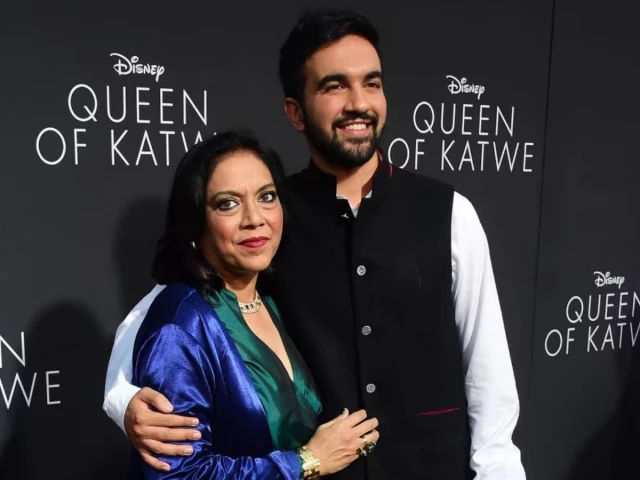 -AFP
-AFP
New York City Mayor Zohran Mamdani faced protests outside his official residence after fresh controversy emerged linking his family to recently released documents connected to Jeffrey Epstein.
Videos shared online showed demonstrators gathering near the mayor’s home, shouting slogans and confronting Mamdani with chants including “we know about your mom.” The remarks referred to the appearance of his mother’s name in Epstein-related records that have circulated publicly in recent days.
The documents mention Mamdani’s mother, a well-known filmmaker, in connection with a social event referenced in the records. No allegations of criminal wrongdoing have been made against her, and the material does not suggest any illegal activity. Still, the association has drawn political backlash and fueled criticism from some quarters.
Winter OlympicsSort By:Relevance
Sporty staples you’ll wear long after the closing ceremony.
Christian Gollayan and Shannen ZitzJan 26, 2026
Hint: It involves a couple missing toe nails.
"This is an absolute honor of a lifetime."
"The best athletes in the world deserve the best storytelling possible."
“You don’t have to be limited by age or fertility levels.”
Cori Ritchey, C.S.C.S.Jan 22, 2026
Is this what he's planning to do after the Winter Olympics?? 👀
Skeleton racer Nathan Crumpton is a model, photographer, and a Princeton grad.
Feb 4, 2022Advertisement - Continue Reading Below
“If I prepare the right way, and if I can wrangle these skill sets, then I belong anywhere.”
A modern take on iconic winter gear.
Christian Gollayan and Shannen ZitzJan 8, 2026
Jam out to this playlist during your next medal-worthy workout.
If you haven’t watched this awe-inspiring airborne event, this is the year to tune in.
Julia Sullivan, CPTJan 6, 2026
Caitlin Carlson and Olivia LuppinoFeb 3, 2026
They also taught the gold medalist (and her brother) how to ski.
“It’s my honor to give her that opportunity.”
Her mom was ski instructor, natch.
![]()
Understand the ins and outs of protein, from the science behind it to how much you need—and how to maximize your intake.
Women athletes are leading the conversation and making history on the court, the track, and the course. Stay up to date here!
Whether you’re working out at home or at the gym, and whether you’re new to fitness or true to it, we’ve got a workout plan (or two!) for you.
Early-stage prostate cancer often presents no symptoms, making regular screenings critical. When symptoms do occur—often due to an enlarged prostate pressing on the urethra—they include frequent, urgent, or weak-stream urination (especially at night), blood in urine or semen, and, in advanced cases, bone pain in the back or hips. Common Urinary Symptoms
These are often caused by the tumor pressing on the urethra:
Physical and Sexual Symptoms
Advanced (Metastatic) Prostate Cancer Symptoms
If the cancer spreads (metastasizes), it may cause:
When to See a Doctor
Many of these symptoms are similar to non-cancerous conditions like benign prostatic hyperplasia (BPH) or infections. However, it is essential to consult a doctor if you experience any of these, particularly blood in your urine or persistent changes in urination, to rule out cancer.
How black people first came to Russia
Black Moors (Arapy) in Russia were primarily Africans brought via the Ottoman slave trade in the 17th–18th centuries, often serving as exotic, high-status attendants for the Romanov court, or as distinct communities in Abkhazia. While many were entertainers or servants, figures like Abram Gannibal rose to nobility, serving as a general under Peter the Great. Key Historical Details:
This video discusses the historical presence of Black individuals in Russia:54s
African History FountainYouTube • 2 Aug 2025
Show allDive deeper in AI ModeAI responses may include mistakes. Learn more
Russia Beyondhttps://www.rbth.com › History8 Mar 2020 — In the retinues of European kings, black servants first appeared at the time of the Crusades. They were also employed in this capacity in Russia ...Read more
JAMAICAN CREATOR OFF HIP HOP :DJ KOOL HERC
NY Carib Newshttps://nycaribnews.com › Blog › Lifestyle › A&E10 Aug 2023 — ” For his contributions, Herc is called a “founding father of hip hop”, a “nascent cultural hero”, and an integral part of the beginnings of hip ...Read more
Britannicahttps://www.britannica.com › ... › Rap & Hip-Hop Music14 Jan 2026 — DJ Kool Herc (born April 16, 1955, Kingston, Jamaica) is a Jamaican American disc jockey (deejay or DJ) who is credited as the founder of hip-hop.Read moreMissing:
hero | Show results with: hero
Teach Rockhttps://teachrock.org › people › dj-kool-hercA Jamaican native who moved to New York City's Bronx borough at the age of 12, Kool Herc is widely credited as the originator of Hip Hop.Read moreMissing:
mr | Show results with: mr
Facebook · Greg Wilson1.3k+ reactions · 2 years ago... hip hop pioneers was DJ Kool Herc, a Jamaican immigrant regarded as the founding father of hip hop. Kool Herc made history in 1973 when he ...Read more
Images
DJ Kool Herc, widely recognized as the founding father of ...
Instagram
Jamaican Pioneer of Hip Hop DJ Kool Herc to be inducted into Rock & Roll Hall of Fame
YouTube
DJ Kool Herc | Hip-hop, Merr
What is Morant Bay known for?Behind the court house is a small park containing the ruins of the Morant Bay Fort. The fort dates from 1758 and was designed to hold nine guns. Three cannons remain there today. During an excavation behind the court house in 1973 in the park, the bodies of 79 people were discovered.
Wikipediahttps://en.wikipedia.org › wiki › Morant_BayWhen was the Morant Bay Rebellion in Jamaica?Is Morant Bay a city in Jamaica?What parish is Morant Bay in Jamaica?How far does $100 go in Jamaica?Which national hero was hanged in Morant Bay?Feedback
Instagram · nestaja130+ likes · 1 week ago
0:53Rehabilitation of the Jack's River road (Eden Hill) in St. Mary, within the constituency represented by Member of Parliament Robert Montague ...
Airbnbhttps://www.airbnb.co.uk › Jamaica › Saint ThomasTop-rated holiday rentals in Golden Grove. Guests agree: these stays are highly rated for location, cleanliness and more.Read more4.9(324)
Jamaica Gleanerhttps://jamaica-gleaner.com › gleaner › cleisure › cleisure716 Aug 2014 — Bull Bay to Yallahs has to be the dirtiest stretch of road in Jamaica. ... St Thomas' capital, Morant Bay, is even more depressing: Blocked ...Read more
Western Unionhttps://www.westernunion.com › global-services › find-l...Send money · Track a transfer · Find locations · My WU · Log in · Register · Register · Log in · svg-icon-logo-big svg-icon-logo-small. X. Home. About us.Read more
Scotiabankhttps://jm.scotiabank.com › connect-with-scotiabankScotiabank has ATMs conveniently located throughout the country, to allow easy access to your money day or night. See below for ATM locations nearest you.Read more
Social Development Commission Jamaicahttps://sdc.gov.jm › contact-usSt. Thomas. 1 Springfield Road Morant Bay, St. Thomas Telephone 1876-584-1529, 1876-982-0232. 1 Springfield Road Morant Bay, St. Thomas Telephone 1876-584 ...Read moreImages
Travelling through the town of Morant Bay, St. Thomas | Driving In Jamaica in 2023
YouTube
Back to School Walk in the town of Morant bay St.Thomas Jamaica 🇯🇲
YouTube
Morant Bay, St.Thomas. Jamaica, 🎥Via: @r1dl3yvideos , Collab your experience here, follow and turn post notification on, #876TravelStThomas #MorantBay #StThomas #Jamaica
Instagram
You are shopping with Alan Hoffman
WELLBEING ONLINE 24/7

ByAnthony ZurcherNorth America correspondent
The Trump administration has quickly abandoned its familiar "deny and attack" playbook after initially using it when federal agents shot dead Alex Pretti in Minneapolis on Saturday morning.
Within 24 hours, as various videos of the shooting circulated online, it became clear that the White House was out of step with public opinion and what Americans could see with their own eyes.
Since then, the administration – and the president himself - have changed tack, blaming Democrats for what happened and focusing less on the actions of the American nurse who was killed.
Democrats, meanwhile, have increased their criticism of the president's mass deportation policy and the aggressive tactics of Immigration and Customs Enforcement (ICE), leaning into a political fight that could result in a new government shutdown on Friday.
On Monday morning, Deputy Attorney General Todd Blanche described the situation as a "powder keg". While he blamed the Democrats, many on both sides of America's political divide will agree that the current situation is fraught with peril.
By Kerry Breen
1.4mShares


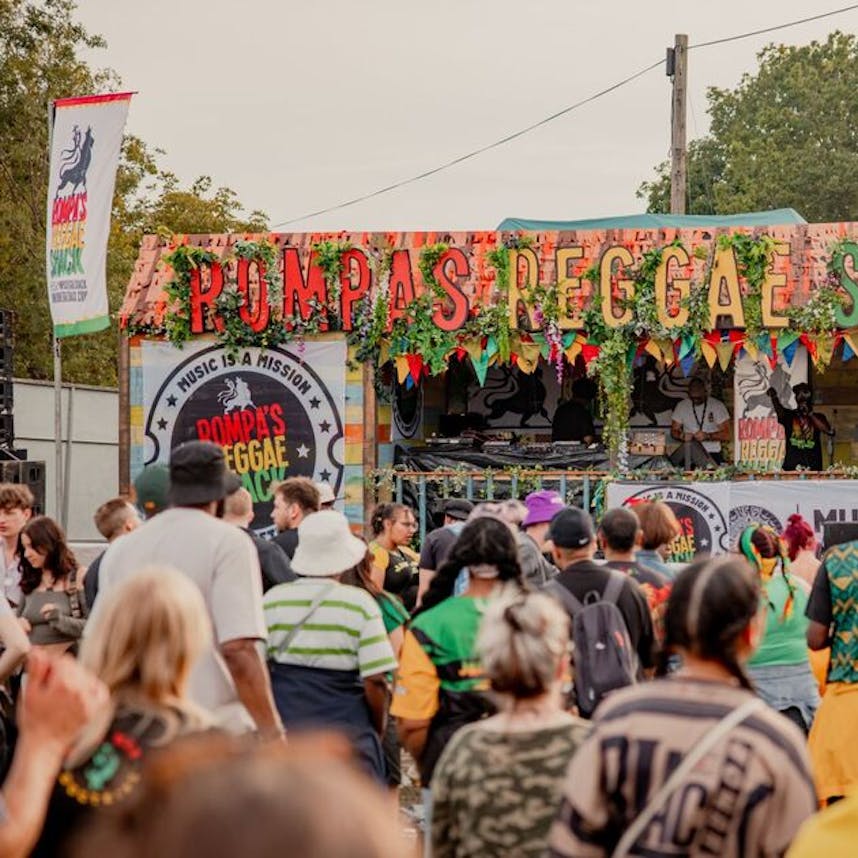 DancehallDubJungleReggae
DancehallDubJungleReggae
Reggae Land returns for 2026 on Saturday 1st and Sunday 2nd August… bigger, deeper, and more cultural than ever.
As the UK’s largest reggae festival, Reggae Land brings together 130 artists across 7 stages for a full-scale celebration of reggae, roots, dancehall, dub and Caribbean culture.
Set at the iconic Milton Keynes Bowl, Reggae Land is more than a music festival. It’s a family, a meeting point, and a shared cultural experience, uniting generations through sound system energy, live bands, selectors, food, fashion and community.
From legendary icons to global voices shaping the future of reggae, Reggae Land delivers a carefully curated lineup alongside immersive spaces that honour the culture and push it forward.
This is reggae at its fullest expression.
This is Reggae Land.
View More>
 ShaggyListen to songs
ShaggyListen to songs


 Ed SoloListen to songs
Ed SoloListen to songs


Shaggy / General Levy / Deekline / Shenseea / Ed Solo / Benny Page / Barrington Levy / Beenie Man / Kranium / Tarrus Riley / Channel One Sound System / KONSHENS / Stylo G / Serani / Mungo's Hi Fi / Congo Natty / Reggae Roast / Top Cat / Ragga Twins / Alborosie / David Rodigan / Prince Fatty / Morgan Heritage / Sanchez / Hollie Cook / Ding Dong / Eva Lazarus / Third world / Richie Spice / Iration Steppas / Mungos Hi Fi / Mad Professor / Aba Shanti-i / Super Cat / Navigator / Jesse Royal / Jah9 / Killa P / Rhoda Dakar / Horseman / Charlie P / Don Letts / Earl Gateshead / Ras Kwame / Fabio & Grooverider / Daddy Nature / Robbo Ranx / Shumba Youth / PRIME/ Jamie Rodigan / Channel One / KAYA FYAH / MC Enamie / Mister Bounce / DJ Nate / Boxer Banton / Vybz Kartel/ ADJ / Sean B / CHARLY BLACK / Gully B / T-Cuts / DJ Larni / Saxon Sound / Ayito / YNG CPTN / Shayna Marie / Josh Skints / BECCA D / Queen Bee / Pure Vibes / JP / DJ Pharaoh G / Sisters In Dub / Mr Vegas / Clapper Priest / Sister Audrey / Jungle Cakes / DJ Chez / Becca Deadly / Congo Natt Y / Dj Dennyhus / Dr Alimantado / Dub Pistols Sound System / MC Go / Liam Monaghan / Lionpulse / Mad Professor & The Ariwa Posse / Mark Ryder / The Wizards / Nadine Sutherland / Raptor Mc / Ras Kwame Presents / Shabba Party Presents Janelle Wynter / Serocee & Friends / Skillzee / The Heatwave Presents Hot Wuk / Uncle Dug / Yng Cptn Sound / T O K / The King & The Royals / Samory I / Sugarkane / DJ Dansey / Sister Aisha / Inner Circle / DJ Ardi / BLVK H3RO / DJ Davda / Omega Nebula / Prince Fatty & Horseman / Greensleeves Hi Fi / VYBZ SR / Cham / Dennyhus / Kash / Side By Side Soundsystem / Little Lion Sound / Reggae Recipe / The League Of Rebelz / Scientist / Ragga Twins Crew / Ken Boothe / Teshay Mekeda
View More>Saturday 1 - Sunday 2 August, 2026The National Bowl in Milton Keynes
Don't miss out!
We can send you a reminder via text or email before the tickets for this event go on sale.
Email address
(required):
Mobile number
(optional):I agree to receive marketing related to this event or artists appearing at this event, according to the Privacy Policy
About
Chinsea Linda Lee, known professionally as Shenseea, is a Jamaican singer. She is best known for her guest appearance alongside Roddy Ricch on Kanye West's 2021 song "Pure Souls," which entered the Billboard Hot 100.
If you enjoy hip-hop and rap crossover tracks, you need to know about Shenseea, a dancehall artist making catchy rhythms and collaborating with other major stars in the music industry. Here are 15 facts even the biggest fans may not have known about the musician.
Words By Guest Contributor4 mins
Shenseea is a Jamaican dancehall artist who rose to fame by providing her vocal stylings to collaborations with prominent artists such as Vybz Kartel, Sean Paul and Christina Aguilera. Her hit track “Blessed” with rapper Tyga has earned roughly 63 million views on YouTube at the time of writing. She shows off her crossover talent on her 2022 debut album, “Alpha.”

01
WELLBEING ONLINE 24/7
Hope you will enjoy what you both hear and see here.
Checkout the parish of st Thomas in Jamaica over the new year. You wouldn’t believe this, good job it’s on video. JPS Light pole in the middle of the road. Yes. You probably already guest what happens next… watch online.
Nice work big super !






Facebook · JAMAICANS ABROAD110+ comments · 2 weeks agoJAM 's NO matter how much MONEY they offer you “DO NOT SELL YOUR LAND”! Jamaicansdiscussing the potential sale of their land to foreigners andTop answer: Yes I support this message. There are people who wait for this opportunity to buy low. Hold ...
Instagram · onlyganjagod96.2K+ likes · 2 weeks ago
0:53DO NOT SELL YOUT LAND JAMAICAN PEOPLE TO NO FOREIGNERS‼️ JAMAICAN PEOPLE COME HOME AND BUY UP THE LAND‼️ #hurricanmelissa #jamaica #jamaicans # ...People also askDoes Jamaica still pay taxes to England?Can you refuse to sell your land?How much is 1/4 acre of land worth in Jamaica?Are there squatter rights in Jamaica?Feedback
Facebook · Peter Gracey660+ reactions · 6 days ago
0:40People will try buy your land and your home and your legacy for pennies under dollar. Jamaicans in the diaspora I want you to listen to me and I ...
Instagram · raskofipresentspermakulture380+ likes · 2 weeks agoIn this powerful message, Jamaican people share their story of resisting foreign aid and protecting their land and community.
Instagram · realdrlovemusic100+ likes · 1 week ago
9:58In the face of a devastating hurricane, Doctor Love urges the people of Westmoreland and St Elizabeth, Jamaica to resist
YouTube · Bless Up JTJ390+ views · 1 week agoNo piece of land want to own don't sell it to anyone no matter how dire things might seem if do own property don't sell it.
All about men
These are results for jamaican men & boys
Search instead for jamaicam men & boys
VideosDo Jamaican men cheat?Instagram · GIDEON ❤️💛💚1 day agoInstagram · GIDEON ❤️💛💚1:08Dating Culture Shock: How Jamaican Men Approach Women ...YouTube · Yaman Girls17 Nov 2024YouTube · Yaman Girls
19:47ALL ABOUT DATING IN JAMAICA! (Men to avoid, what to ...YouTube · Annesha Adams23 Oct 2024YouTube · Annesha Adams
15:16WARNING: 8 Struggles of Dating a Jamaican Man ...YouTube · The Crooks20 Mar 2024YouTube · The Crooks
33:33
9 key moments in this videoView all
Pinteresthttps://www.pinterest.com › purttybirdyquetzal › jamaic...Explore a hand-picked collection of Pins about Jamaican men on Pinterest.
Adobe Stockhttps://stock.adobe.com › searchSearch from thousands of royalty-free Jamaican Man stock images and video for your next project. Download royalty-free stock photos, vectors, HD footage and ...
People also askHow do you know if a Jamaican man likes you?What is Jamaican slang for friend or boy?What are Jamaican personality traits?What ethnicity do Jamaicans identify as?Feedback
YouTube · Deeoptimistic Network21.1K+ views · 5 years ago
16:10Jamaican men are like any other man in the world they'll lie they'll cheat they'll call you they'll do whatever any other man will do.
Facebook · Motivational Vybz Tv4.2K+ reactions · 4 months agoWhat do you tell your children about dating? How soon after a break up should you start dating again? How long should you date before sex?See moreImages
Jamaican men
Pinterest
Jamaican Men, Beauty or the Beast? - Jamaican At Heart
Jamaican at Heart
Jamaican men
PinterestShow more images
Shutterstockhttps://www.shutterstock.com › search › jamaican-youn...Find 10+ Hundred Jamaican Young Man stock images in HD and millions of other royalty-free stock photos, 3D objects, illustrations and vectors in the ...
US$2.90 to US$349.00
TikTok · Beach Baby Tours Jamaica179.1K+ views · 4 months ago
5:51Jamaican men are loyal and loving! Find out why they make incredible partners. Embrace confidence, family, and commitment. #family #dating # ...
Reddit · r/Jamaica50+ comments · 9 months agoI've been seeing all over Reddit, Twitter, and TikTok that Jamaican men will treat you right, spoil you, cook, clean... but also definitely cheat.See moreAre decent Jamaican men back home interested in ...150 posts18 May 2025Im dating a Jamaican man any tips?? : r/Jamaica - Reddit126 posts16 Sept 2025More results from www.reddit.com
Instagram · mouta_massi350+ likes · 1 month ago
0:54Get an inside look at the lives of Jamaican men, exploring their values, passions, and interests ... What country has the most attractive guys
Both forms of heat therapy have their benefits.
By Kaitlyn LuckoffPublished: Jun 08, 2025 7:00 AM EDTSAVE ARTICLE
 Inti St Clair/Blend Images
Inti St Clair/Blend Images
The newest social club? Saunas. Spending time in dry heat is a win-win—you can reap health benefits while hanging out with your friends (which seems like a trend everyone is doing now at wellness clubs). But steam rooms aren’t getting the same treatment—is there a reason why? Are they as helpful for your health?
In short, both saunas and steam rooms use heat to increase the body’s core temperature and sweat rate, says exercise physiologist Rachelle Reed, PhD, ACSM-EP. The main difference between the two is climate; the sauna is hotter, but steam rooms are more humid.
Meet the experts: Rachelle Reed, PhD, ACSM-EP, is an exercise physiologist and the Director of Health and Science at Perspire Sauna Studio in Athens, Georgia. Lance Dalleck, PhD, is a professor of exercise and sport science at Western Colorado University. Reuben Chen, MD, is a board-certified physician specializing in sports medicine and pain management and the Chief Medical Advisor at Sunrider International.
More From Women's HealthJoin The Women's Health Ultimate Pull-Up PlanWATCH: Join The Women's Health Ultimate Pull-Up Plan
UNMUTE
 WATCH FULL VIDEO
WATCH FULL VIDEO
When your body is exposed to heat, it tries to re-regulate your temperature, which increases your heart rate, says Reed. So, if you use a sauna or steam room after a workout, it will somewhat prolong the cardiovascular workoutwhile you’re just sitting relaxing, she adds.
When you work hard to sweat, your systolic blood pressure can also increase, improving your circulation, Reed adds. Sweating in sauna or steam rooms may even lower your risk of heart disease, says Lance Dalleck, PhD, a professor of exercise and sport science at Western Colorado University.
So, which form of heat therapy should you make part of your post-workout practice? Ahead, experts dive into the benefits of both—and which one is more effective for your health.
 10 Sauna Benefits You Probably Don't Know About
10 Sauna Benefits You Probably Don't Know AboutAdvertisement - Continue Reading Below
 How To Minimize Your Pores, Per Dermatologists
How To Minimize Your Pores, Per Dermatologists This At-Home Skincare Routine Will Clear Acne
This At-Home Skincare Routine Will Clear AcneBogle had become a friend of a wealthy landowner and fellow Baptist George William Gordon, a bi-racial man who served in the Assembly as one of two representatives from St. Thomas-in-the-East parish. Gordon was instrumental in Bogle being appointed deacon of Stony Gut Baptist Church in 1864. Conditions were hard for black peasants, due to social discrimination, flooding and crop failure, and epidemics. The required payment of poll taxesprevented most of them from voting. In August 1865, Gordon criticised the governor of Jamaica, Edward John Eyre, for sanctioning "everything done by the higher class to the oppression of the negroes".[4]
So history buffs help me out here, so you see how most European countries are reproached for their colonial and imperial past by most African and Asian countries even when their own countries have it those pasts too basically it's like playing a game then blaming the top player. So why is it so?
•3y ago•Edited 3y ago
I think it's largely because of scale and effect on the present day. It's absolutely true that there were slave empires in Africa before the arrival of Europeans, Japan tried to create a Japanese-centric greater East Asian empire during World War II and killed millions of people, the Mongols basically killed off anyone who wouldn't submit to them as they moved across Asia and Eastern Europe etc, so there's plenty of examples of this kind of thing from non-European nations.
The difference is that European colonialism basically touched every single continent on the planet. Both of the Americas, all of Africa, and a huge swathe of Asia was either directly or indirectly controlled and/or colonized by European powers/European descendants at one point or another in the run up to the 20th century, and even Australia became Britain's de facto dumping ground for convict peoples. So just the immensity of it is something to consider. I mean Britain controlled an empire that at one point held what...like a quarter of the world's territory and a third of the world's population? And that's just Britain alone, not even including the other major players like France, the Netherlands, Spain, Portugal, and even lesser one's like Germany, Italy, Belgium (Also the USA even though it's not "European" but still a Western power). I'm sure I'm forgetting some but you get the idea.
This brings me to my second point. Together with the scale of European colonialism, those empires only died out relatively recently in terms of world history (early-mid 20th century, still ongoing in a lot of ways though) and their immediate impact on other peoples has been more profound because of that. For sure the Mongols basically ruled over the greatest empire in terms of land mass and they tortured and killed millions, but that was roughly what, like 600-800 years ago? It doesn't have the same immediate ramifications. Today the West in general is much richer and more privileged today than other countries because of their (relatively) recent colonial exploitations. How many projects in Belgium were funded in some way by the 19th-20th century rubber and mineral exploits in the Congo? (I have no idea but it's just an example). Or how about the United States? The institution of chattel slavery was valued anywhere between 5-25 trillion dollars today in terms of assets that contributed to the American economy, we still feel the effects of that today. Or Britain? Queue your standard joke about how non-British your average British museum is TODAY. Stuff like that. So, much of the money/power that goes into what the West looks like and how it functions today came directly out of those recent colonial ventures, and many previously colonized nations are comparatively worse off still because of that.
It's not so much that people are saying that European/Westerners are the only ones to blame for imperialism (they're not as I've said, human beings of every description everywhere have the capacity to be shitty and exploitive) it's just that the scope of what Europeans did is much greater, much more recent, and has a larger historical footprint, therefore they deserve greater scrutiny. No one is "blaming" Mongolia for the Mongol hordes today because we don't live with the immediate consequences of that anymore (relatively speaking, obviously the Mongol invasions had a big impact on world history). Kind of a jumbled answer but still. Likewise no one "blames" Muslim countries for the 8th century attacks of the early Islamic empires into parts of Europe today, even though it happened and it was just as brutal as any other expansionist move, with killings, theft, forced conversions, whatever. But too much time has passed and too much has happened in the interim for it too hold the same significance in peoples' minds as more recent stuff.
I think also it depends on who you ask, every country is different. Like Japan still hasn't officially apologized to China for killing millions during World War II, but you never hear about it in the Western centric media landscape.
I'll also say that this is a very complex topic as well, I'm sure someone here will give a more concise answer.
Some women may believe they don't need men due to societal shifts, increased financial independence, and a desire for autonomy. This can stem from experiences of inequality, patriarchal structures, or simply a personal preference for a single life. Consequences can include a different path in relationships, career choices, and social dynamics. However, it's crucial to remember that this is a complex issue with diverse perspectives and individual experiences.
Please spread the word ...
The Jamaica government has a hurricane grant program to assist homeowners who have suffered damage to their properties. The government has allocated over $1 billion to provide grants and assistance for restoration, reconstruction, and relocation efforts.
Grant Amounts:
• Minor Damage: Up to $50,000 for homes with minor damage
• Severe Damage: Up to $150,000 for homes with severe damage
• Total Destruction: Up to $400,000 for homes that are completely destroyed
Eligibility Criteria:
• Homeowners must have suffered damage to their properties due to the hurricane
• The damage assessment will determine the level of grant assistance
• Applicants must provide necessary documentation, including proof of ownership and damage assessment reports
How to Apply:
• Contact the Ministry of Labour and Social Security or visit their website for more information
• Submit an application and supporting documents, including photographs of property damage and proof of reduced income or unemployment¹
Labour Division
• Address: 1F North Street, Kingston, Jamaica
• Telephone: (876) 676-5694, (876) 676-5695, (876) 676-5696, (876) 922-9500-17
• Social Security Division
• Address: 14 National Heroes Circle, Kingston 4, Jamaica
• Telephone: (876) 922-8000-13, (876) 676-5629, (876) 676-5630, (876) 676-5631, (876) 676-5557
• Toll-Free: (888) 991-7284 (P.A.D)
•
WhatsApp Contact: 876-850-9498
General Email: prunit@mlss.gov.jm
https://mlss.gov.jm/contact-us-3/
Additionally, the National Housing Trust (NHT) has introduced a special mortgage moratorium to assist contributors and mortgagors impacted by natural disasters. The NHT also offers a Home Improvement loan to assist with roof and home repairs, with up to JMD 1.5 million per collateral.²
To submit an NHT special mortgage moratorium application, you can do so either online or in person through the following steps:
Online Application
Visit the National Housing Trust’s official website at www.nht.gov.jm.
Locate the special mortgage moratorium application form—usually available under the “Disaster Relief Facilities” or “Customer Services” section.
Complete the online application form by providing all required details, including your personal information, mortgage account number, and documentation showing impact from the natural disaster (such as photos of damage or proof of financial hardship).
Upload required supporting documents, including:
• Valid government-issued ID,
• Tax Registration Number (TRN),
• Evidence of property damage or income loss.
Submit the application and retain confirmation details or reference number for follow-up.
Contact for Help
• For guidance or questions, call NHT customer service or use their WhatsApp contact: 876-850-9498.
• Visit NHT’s official social media pages or website for updates and possible deadline extens
KINGSTON, Jamaica — Several Chinese nationals have stepped up to support relief efforts for communities affected by Hurricane Melissa in St Elizabeth.
Videos shared on Instagram by Neil Yap Sam show volunteers at the Chinese Benevolent Association centre packing care packages destined for the hurricane-hit areas.
LATEST NEWS, SPORTSDecision on schoolboy football resumption expected FridayNovember 7, 2025
The packages, which contain essential items such as food, water, and hygiene products, are part of a broader effort to provide immediate assistance to residents struggling in the aftermath of the hurricane.
Enter datesAttractionsFiltersSortMapCategory typesAttractionsToursDay TripsOutdoor ActivitiesFood & DrinkTransportationTypes of AttractionsNature & ParksSights & LandmarksSpas & WellnessMuseumsTraveller rating
Good for
Show more13 results sorted by traveller favouritesWe perform checks on reviews.

4.07Beaches![]() By JADEYY00This beach is beautiful. if you, your friend or family member works at the university of the west indies you will get...
By JADEYY00This beach is beautiful. if you, your friend or family member works at the university of the west indies you will get...

4.03Waterfalls By Notating53Located on the roadside of the main road in St Thomas the gem of a free waterfalls is perfect for Spring water street...
By Notating53Located on the roadside of the main road in St Thomas the gem of a free waterfalls is perfect for Spring water street...

4.022Bus Services • WaterfallsOpen nowReggae Falls or Reggae Falls Travel & Tours is a waterfalls and attraction site. We provide tour guide services onsite as well as transportation and airport transfer service through .

3.77Points of Interest & Landmarks • Lighthouses By Notating53The drive there is on very rough unpaved roads. The roads in and to the lighthouse are the worst! It is best to drive...
By Notating53The drive there is on very rough unpaved roads. The roads in and to the lighthouse are the worst! It is best to drive...

Lighthouses
History Museums


5.01Historical & Heritage Tours • Taxis & Shuttles♠Visit historic Judgement Cliff, MB Courthouse, 3Finger Jack, Old Rum estate, The Spring or Falls, etc. ♠Hike & Camp in Timesha's Park Valley&Mountain. ♠Enjoy Riverside experience. ♠Chill at the beach…

Taxis & Shuttles • Walking ToursLocated minutes from Albion in St Thomas Jamaica. Enjoy this elegant, comfy, exclusive getaway and Oasis. We offer a tranquil and peaceful atmosphere for those in need of rest and relaxation. Wake…

Climbing Tours • Hiking & Camping ToursRest assured you'll be in good safe hands! Your guide is military trained in Jungle survival. Outdoors Vybz Survival Adventures offer a military escape and survival adventures in the hills, on the…
Serious flooding in Seaforth st Thomas Jamaica
📷21:07Severe flooding impacted Seaford, Black Smith Lane in Western St. Thomas, as the Johnson River overflowed its banks following days of heavy ...
YouTube · Eastside Media13.7k+ views · 14 hours ago
30:53Flooding was observed along the Port Morant to Bowdoin corridor in St. Thomas following 2 days of heavy rainfall across Jamaica.
YouTube · Klarityflex Jamaica TV750+ views · 15 hours ago
25:59All Night Rain//Serious Flooding Washing Away Houses In Black Smith Lane Seaforth St Thomas. 759 views · 2 hours ago ...more. Klarityflex ...
Instagram · tvjnews10+ likes · 5 hours ago
1:55Residents of Black Smith Lane in Seaforth, St Thomas are once again under threat from flooding, as the Johnson River overflowed its banks ...Missing:
searious | Show results with: searious
YouTube · Klarityflex Jamaica TV210+ views · 9 hours ago
43:17All Night Rain//Serious Flooding Washing Away Houses In Black Smith Lane Seaforth St Thomas. Klarityflex Jamaica TV New 4.6K views · 22:11.
TikTok · Jamaica Gleaner410+ views · 14 hours ago
0:27The Meteorological Service has issued a flash flood watch for low-lying
It has been almost 160 years since this most terrifying event that took place on the original residents of stony gut in spring garden, St Thomas jamaica.
And there has not been any signs of compensation for the homes that were burned to the ground and over 500 dead.
when drawing comparisons to the current
wars around the world in particular the Ukraine, were funds have already been ear marked for the regeneration of the loss of the people of Ukraine. The leaders of the modern world has consistently closed there eyes tightly when it comes to compensating the original families of stony gut.
let us hear your views at the subscribe & messages link. Thanks for your time
IT IS Time that the british government should include compensation in respects of this horrific time in both Jamaican & British history at the following link along side the compensation for windrush generation
https://www.gov.uk/government/publications/windrush-compensation-scheme-claim-forms-and-guidance/close-family-member-windrush-compensation-claim-guidance
Bogle concentrated on improving the conditions of the poor.[5] As awareness of social injustices and people's grievances grew, Bogle led a group of small farmers 45 miles to the capital, Spanish Town, hoping to meet with Governor Eyre to discuss their issues, but they were denied an audience.[6] The people of Stony Gut lost confidence and trust in the Government, and Bogle's supporters grew in number in the parish.
by Josh Ryan-Collins (Author)4.6 4.6 out of 5 stars 65 ratingsPart of: The Future of Capitalism (11 books) See all formats and editions
Throughout the Western world, a whole generation is being priced out of the housing market. For millions of people, particularly millennials, the basic goal of acquiring decent, affordable accommodation is a distant dream.
Leading economist Josh Ryan-Collins argues that to understand this crisis, we must examine a crucial paradox at the heart of modern capitalism. The interaction of private home ownership and a lightly regulated commercial banking system leads to a feedback cycle. Unlimited credit and money flows into an inherently finite supply of property, which causes rising house prices, declining home ownership, rising inequality and debt, stagnant growth and financial instability. Radical reforms are needed to break the cycle.
African Caribbean Community Initiativehttps://acci.org.ukThe African Caribbean Community Initiative (ACCI) is a holistic and comprehensive support service for the African Caribbeans affected by mental ill health. Our ...
Wolverhampton WV1 4BA. Tel: 01902 571 230. Fax: 01902 ...
The African Caribbean Community Initiative (ACCI) was initially set ...
217 Waterloo Terrace, Newhampton Road East ...
Why work for ACCI ... We're a leading charity providing mental ...
Why volunteer for ACCI? ... Help cre
The following web page discusses the legacy of colonialism at Trengwainton and historic slavery and includes references to histories that some people may find upsetting.
The Price family owned large sugar plantations on Jamaica. They descended from Francis Price (1635-1689) who was believed to be a junior officer at the island’s conquest of 1655. Francis acquired his first Jamaican plantation in 1663, and subsequently bought further estates. In 1670, after England gained formal possession of Jamaica, he acquired 840 acres which he named Worthy Park.
Worthy Park passed through the hands of various members of the Price family, including John Price of Penzance the Younger (1838-97), Rose Price’s father. John Price was mostly absent from Worthy Park, running his plantations from England through local agents. His son Rose Price was educated at Penzance Grammar School, Harrow and then Oxford University, before embarking on a Grand Tour.
In 1791 the family estates in Jamaica, including Worthy Park, were in trouble owing to unscrupulous local agents. Rose Price travelled to Jamaica to assume direct management, where it is claimed he doubled their value.
Rose Price made detailed records which survive in his great plantation book, covering the years 1792-96, now held by the Library of Congress. In this we learn he expanded sugar-cane cultivation by 25% within three years. In order to achieve this, Price had expanded the number of enslaved people at Worthy Park from 355 to over 500. He also introduced adapted Cornish mining technology for mills and brought Cornishmen to assist in the plantation management.
The enslaved people working at Worthy Park came predominately from Africa. They, and their descendants, were deployed in the harvesting of sugar cane, but also worked in the production of sugar and rum. Others worked as carpenters and blacksmiths, a midwife and nurses, and in the 'great house' worked a 50-year-old cook named 'Penzance'. In his great plantation book, Price records the birth of two children with Lizette, a 13-year-old enslaved child, during the three years he spent at Worthy Park. Once older, he sent them to England to be educated.
Rose Price returned from Jamaica in 1795 and that year married Elizabeth Lambert, niece of Lord Sherborne in Gloucestershire. His income from Jamaican estates was then around £6,000 a year, and he continued to invest in further plantations.
Price remained committed to slavery and became a staunch anti-abolitionist. In 1832, whilst living at Trengwainton, he wrote a defence entitled Pledges on Colonial Slavery, to Candidates for Seats in Parliament, Rightly Considered. This included his response to a pro-abolition article published in the West Briton on 7 December 1832. In his response, Price claimed, by giving various examples, that the treatment of enslaved people on plantations in Jamaica was better than of most labourers in England, and 'milder' than in ancient Egypt, Greece and Rome. His defence of colonial slavery is followed by printed letters in support of his view.
Rose Price died soon after British Parliament passed the Abolition Act in 1833. His executors later received over £10,000 compensation awarded to owners of formerly enslaved people. Despite this large sum, Price’s finances were not sound: he had encumbered both his Jamaican and Cornish estates with substantial debts, and Trengwainton was sold by its mortgage holders in 1835.
We know that there is still work to do in interpreting and exploring this part of history attached to Trengwainton garden and are working with partners through the Inclusive Global History project. Please contact Claire North (claire.north@nationaltrust.org.uk) for further information.
Read our report addressing our histories of colonialism and historic slavery.
By the end of 1865 the "Governor Eyre Case" had become the subject of widespread national debate. In January 1866, a Royal Commission was sent to investigate the events. Governor Eyre was suspended and recalled to England and eventually dismissed. The national government changed that of Jamaica. The House of Assembly resigned its charter, and Jamaica was made a Crown Colony, governed directly by Britain.[9]
The "Eyre Controversy" turned into a long and increasingly public issue, dividing well-known figures of the day. It may have contributed to the fall of the government.

In the late 1800s, people in many parts of the world decided to leave their homes and immigrate to the United States. Fleeing crop failure, land and job shortages, rising taxes, and famine, many came to the U. S. because it was perceived as the land of economic opportunity. Others came seeking personal freedom or relief from political and religious persecution, and nearly 12 million immigrants arrived in the United States between 1870 and 1900. During the 1870s and 1880s, the vast majority of these people were from Germany, Ireland, and England - the principal sources of immigration before the Civil War. Even so, a relatively large group of Chinese immigrated to the United States between the start of the California gold rush in 1849 and 1882, when federal law stopped their immigration.
With the onset of hard economic times in the 1870s, European immigrants and Americans began to compete for the jobs traditionally reserved for the Chinese. With economic competition came dislike and even racial suspicion and hatred. Such feelings were accompanied by anti-Chinese riots and pressure, especially in California, for the exclusion of Chinese immigrants from the United States. The result of this pressure was the Chinese Exclusion Act, passed by Congress in 1882. This Act virtually ended Chinese immigration for nearly a century.
Immigrants entered the United States through several ports. Those from Europe generally came through East Coast facilities, while those from Asia generally entered through West Coast centers. More than 70 percent of all immigrants, however, entered through New York City, which came to be known as the "Golden Door." Throughout the late 1800s, most immigrants arriving in New York entered at the Castle Garden depot near the tip of Manhattan. In 1892, the federal government opened a new immigration processing center on Ellis Island in New York harbor.
Although immigrants often settled near ports of entry, a large number did find their way inland. Many states, especially those with sparse populations, actively sought to attract immigrants by offering jobs or land for farming. Many immigrants wanted to move to communities established by previous settlers from their homelands.
Great House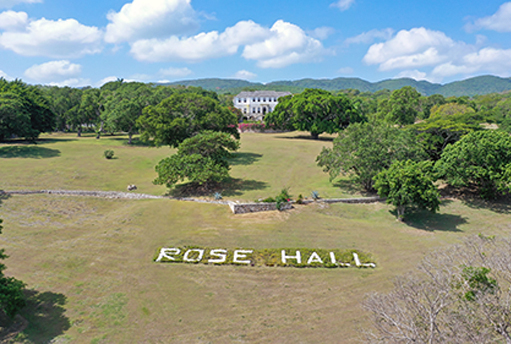
At the heart of the property is the historic Rose Hall Great House, a restored 18th-century architectural masterpiece. Home of the notorious White Witch of Rose Hall: Annee Palmer. Known famously to have killed three husbands and taken on numerous slave lovers, only to die by the hands of the one she loved the most. The Rose Hall Great House offers both Day and Night guided Tours in over 10 languages.
The beauty and views of the Rose Hall Great House is sure to capture your heart. Neighbouring luxury residential communities, featuring golf course frontage with panoramic views of the Caribbean Sea and home to two of the Caribbean’s most widely acclaimed golf courses, Rose Hall offers 36 holes of championship play designed by Rick Baril, Robert von Hagge.
Monday-Saturday From 9:00am to 5:00pm
Closed on Sundays & Public Holidays
Immerse yourself in the heritage of the island as your expert guide shares the story of this colonial ruin restored to its former majesty in the 1960’s. Learn about the lifestyle of the European bourgeoisie in the isles of the Caribbean in the Eighteenth Century. The tale of the Annee Palmer, the famed White Witch of Rose Hall is sure to delight. Beautiful tropical gardens and personalities will colour your experience with fun along the way!
Wednesday-Saturday From 6:00pm to 9:00pm
At night, Rose Hall is not for the faint of heart! Immerse yourself in the lifestyle of the 19th-century European bourgeoisie…but with a twist. You will come to know the true horrors of the “White Witch of Rose Hall”, Annee Palmer, and the many spirits that walk the halls of the Rose Hall Great House at night. Hear the spine-chilling historic tale of the notorious murders and feel the house come alive through an interactive tour set in the 19th century… Afterwards, steady your nerves with a ‘Witches Brew’ cocktail at the Dungeon Bar.
Visit us today… the White Witch awaits.
When your team works together, your efforts combine so your business & endeavours works for you. We give you the tools and support, you turn your aspirations into reality on your own terms and at your own pace.
That is why we have presented the the selection of videos and tutorials that you can use in your own time to improve not just your mood, but your larger circle.
Fulljoy your vintage Saturday !
PLEASE ASSIST JAMAICA IN ANY WAY THAT YOU CAN IN THESE DIFFICULT TIMES !
Football fan rivalries are intense, often historic conflicts between supporter groups driven by geographical proximity, competition for honors, or socio-political differences. Key examples include Celtic-Rangers, Liverpool-Man United, and El Clásico, which define the passion and often volatile atmosphere of the sport. These rivalries are deeply embedded in local culture, sometimes leading to violent "hooliganism". This video shows a heated debate about some of the best local football rivalries:25:22
WHFCYouTube • 22 Jan 2026Major Global and Regional Rivalries
Key Factors Driving Rivalry
Rivalry Dynamics & Hooliganism
This video explores some of the intense rivalries in English football:25:22
WHFC
4 languages
Cass is a 2008 British crime dramafilm. It stars Nonso Anozie as Cass Pennant and is directed by Jon S. Baird.
Cass is based on the true story of the life of Cass Pennant, adapted from his book. The film tells of how he was adopted by an elderly white couple in 1958 and brought up in Slade Green, an all-white area of London. Cass is forced to endure racist bullying on a daily basis from local children, who also ridicule his feminine-sounding name, "Carol", a name given to him at birth. Cass finds through violence the respect he never had and becomes addicted to the buzz of fighting. Cass leads the Inter City Firm to victories against large hooligan firms, such as Leeds in 1980, but becomes frustrated with the lack of publicity the ICF are receiving. So he creates cards with the infamous slogan, "Congratulations, you have just met the famous ICF", and gives a TV interview, increasing the firm's notoriety for humiliation, their speciality. However, the government under Margaret Thatcher begins to come down hard on hooliganism, and after an organised attack on a group of Newcastle Unitedsupporters, Cass is imprisoned for four years. Whilst in Wormwood Scrubs, Cass begins writing his autobiography, in the hope he can generate some income upon the book being published; however his writings are confiscated by the prison upon his release.
Cass is delighted to receive a hero's welcome upon his return, and begins dating Elaine (Natalie Press). This, as well as Cass's rejection of his biological parents after their attempts to contact him, improves his relationship with his adoptive parents after they began to disapprove of his violent lifestyle. Despite having a good relationship with Elaine, Cass is still lured to the violence of hooliganism, and when one of his best friends, Prentice (Gavin Brocker), is attacked by Arsenalsupporters with knives, Cass seeks revenge. He is stabbed in the following fight, and Elaine is disgusted, fearing he is returning to his old ways, as she reveals she is pregnant with his child.
As time progresses to the early 1990s, the ecstasy era takes over, and hooliganism becomes less of an attraction for Cass, and for many other hooligan firms. By 1992, he has settled down in Penge, South London, with his young son and Elaine, who is pregnant again. Cass gets a job as a bouncer outside nightclubs, working for Ray (Tamer Hassan), a long-time friend from his ICF days. However one evening, just after starting a shift at the nightclub, Cass is shot three times by the group of Arsenal supporters that he feuded with back in the 1980s. Cass survives, but wakes up to hear the tragic news that his mother has died.
In the following weeks, Cass is haunted by his demons after the shooting; he sees visions of his attacker, he can't sleep and on one occasion, makes a violent outburst at his son. Cass's friend Ray has tracked down his attackers and offers Cass the opportunity to kill them. Cass is taken to a pub and holds a gun to his attacker's head at point-blank range, but decides not to pull the trigger. The film ends as Cass walks away from the pub and into the distance.
Pennant himself plays a cameo role in the movie as the character "Biggs", who is one of the bouncers.
hope you find this a good watch.

by MMA Fighting NewswireUpdated Oct 10, 2021 at 1:28 AM GMT+1
The Tyson Fury vs. Deontay Wilder full fight video showcases the two memorable clashes between the two heavyweight stars ahead of their trilogy match Saturday night.
The first meeting between Tyson Fury and Deontay Wilder took place Dec. 1, 2018 at the Staples Center in Los Angeles. Fury and Wilder ended their clash in a split draw (115-112 Wilder, 114-112 Fury and 113-113 draw), allowing Wilder to retain his WBC heavyweight title.
ST THOMAS JAMAICA STANDING UP TO CHILD ABUSE
A group of young people has decided to take a stand and 'Be the Change' they want to see in Jamaica. Forming a foundation around their mission, the activists' main focus at this point is child abuse.
Originator of Be the Change Foundation, Monique Mitchell told Rural Xpress that she identified that there was a lapse in the system and many children were silently suffering from abuse. She knew she had to do something about it, so she began seeking volunteers who are passionate about making a change.
Under the theme: 'Break the Silence: Uncover the Abuse', their initial campaign hopes to educate the communities in St Thomas about the definition of child abuse, what constitutes child abuse, measures to take if they, or someone they know, is being abused and, ultimately, ways in which they can prevent the mistreatment.
"Though the foundation is island-focused, our first campaign will be done here in St Thomas and we hope that it will impact the rest of Jamaica," said Mitchell, who revealed that her interest in making a change stemmed from her own childhood.
I was abused at a young age and I realised that it had taken a toll on my life. The fact that no one else knew about it drove me crazy. I kept gravitating to the wrong things, but then I realised that overcoming my fear of the abuse would allow me to be a better person. It also led me to realise that a lot of people need to know that it wasn't their fault that they were abused or had a terrible childhood, so it makes no sense they beat up themselves about it for the rest of their lives," she said, adding that those abused need help and guidance.
And thus, the foundation was formed.
Though the official launch date for Let's Be The Change Foundation is set for December 12, Mitchell said a meeting was recently held in an attempt to recruit volunteers for the movement. The campaign, she said, is going well so far.
"We have a few dedicated team members and volunteers. So far, we've been flooding social media with pictures we've been taking for the campaign. The pictures are of us covering our eyes and mouth to signal the abuse and break the silence, respectively," Mitchell said.
According to her: "Starting next week (this week), we'll be going into the schools and various communities to host presentations on child abuse. The public needs to hear us."
Rasheda Rodney-Samuels, the event manager of the foundation, told Rural Xpress that they are now in the process of seeking sponsorship to fund the various campaigns.
"We're not only asking for their money, but we also need their involvement. We don't want to just have community members involved to give people the idea that this will only last for a couple of months. When we have the various businesses and government entities on board, then it becomes more noticeable," she said, advising that this will cause the campaigns to cover a larger population, thus influencing more feedback and results. Volunteers are still being asked to reach out.
Greg EvansFriday 07 March 2025 17:47 GMTComments

The YouTube sensations the Sidemen return on Saturday (March 8) with the latest edition of their football charity match, which is being held at Wembley Stadium.
The collective, who have more than 22 million subscribers on YouTube, is made up of online stars including KSI, Wroetoshaw, Miniminter, Behzinga, TBJZL, Vikkstar123 and Zerkaa.
The group formed in 2013 to initially record themselves playing games like Grand Theft Auto V together. Their popularity has flourished ever since, evolving into other ventures including a clothing brand, a fast food restaurant chain, a book and their own Netflix documentary.
They have held charity football matches since 2016, previously playing the games at Southampton’s St Mary’s Stadium, Charlton’s The Valley, and West Ham’s London Stadium.
Saturday’s game will be the biggest that they have ever hosted, having sold-out Wembley with more than 90,000 fans expected to attend. This year money is being raised for Bright Side and BBC Children in Need.
RECOMMENDEDTeen girl killed by pack of neglected dogs as she tried to help them, neighbors sayThe euro will get a new member next year – and not everyone is pleasedLookup Your Name. Claim up to £5,928!Scan and Claim| SponsoredBullinghope: If You Were Born Between 1940-1975 You Could Be Eligible For This Life CoverReassured| SponsoredPowered by Taboola
The fifth match, held in 2023, raised more than £2m for charity. It also broke a Guinness world record for the most viewers for a sports event live stream on social media after 2,558,501 people tuned in.

Fans of popular YouTubers will be able to stream the event on the group’s official channel from 2.10pm GMT on 8 March.
The game itself is always contested between the Sidemen’s team and the YouTube AllStars with the Sidemen winning all but one of the matches so far.
Although the starting XI for both sides will be announced before Saturday’s 3 pm kick-off, the squads for both teams have already been announced with major YouTube stars, Logan Paul, iShowSpeed and MrBeast, all set to play.

Email*SIGN UP
I would like to be emailed about offers, events and updates from The Independent. Read our Privacy notice
The YouTube sensations the Sidemen return on Saturday (March 8) with the latest edition of their football charity
We are here to make sure that those running
We aim to improve the quality of life and health of everyone living or working within our borough.
We want to:
We do this through working with diverse communities and nurturing partnerships, like the Local Compact.
The Local Compact is a partnership that brings together people from across the borough and helps us to work towards common goals.
It's made up of people from:
This partnership helps us to create and manage cultural opportunities, events and projects that improve all of our lives.
You can find your local co-ordinator and contact them for help to:
We also work with voluntary organisations within the borough:
If your community organisation has a problem in the council building it's based in, let us know. We can help with repairs and maintenance.
Through the Programme’s targeted capacity-building sessions, law enforcement officials at the nation’s maritime and seaports, airport authorities and customs agents now boast of improved detection capabilities. The Programme is also providing legal advice and legislative support in the development of a new Firearms Bill, a legislative framework governing small arms reduction.
Further, it has also facilitated meaningful research by launching the first Violence Audit conducted in Jamaica. The Audit is the first time a clear baseline has been established on the use of small arms and light weapons in volatile communities. Moreover, the inter-agency technical working group, an innovative component of the programme, has fostered increased collaboration and information sharing, ensuring a comprehensive and people-centered approach to tackling violence.
The Programme has also worked closely with educators and youth to foster firearm free and peaceful school communities. Engaging closely with the Ministry of Education and Youth, the Programme has led to the establishment of clear guidelines on reducing the presence of firearms in schools, opening channels of communications to various breaches and recording incidents of use. For vulnerable youth, the Programme has been instrumental in setting up “Youth For Peace Clubs” that are helping inculcate peaceful conflict mediation skills, manage their social and emotional behaviours and tackle gender stereotypes to bring about change.
One teacher, participating in the training, commented, "I really appreciated all that was shared about peace. My main take away is that peace is more than just a word but an active tool to effect positive change in all our lives and improve the quality of our lives. What I will do now is to promote peace in all my classes and guide my students to peaceful resolutions for their conflicts.”
Reflecting on how interpersonal conflicts would earlier escalate into fights and the change since the Programme’s intervention, two youth participants to the training said, “I learned the difference between conflict and violence. I want to use my learnings to change the school. I want to be a change maker. I want to create a Youth For Peace Club at my school.”
“It is time for the Government to take action and ban machetes, and zombie knives with immediate effect.”
Friday, March 14, 2025
Subscribe to Newsletter »

By Karl Pearson on Sunday, November 21, 2010 - 2 comments
 Gun and knives crime appears to be an increasing problem the world over with more than Three Million (3,000,000) lives taken by it each year and it is probably fair to say that Jamaica has more than its share. A campaign is now underway there to try and unify people into saying enough really is enough.
Gun and knives crime appears to be an increasing problem the world over with more than Three Million (3,000,000) lives taken by it each year and it is probably fair to say that Jamaica has more than its share. A campaign is now underway there to try and unify people into saying enough really is enough.
The “No To Guns! Yes To Life International Awareness Campaign Against Gun, Knife & Gang Violence” is being spear headed by Black Music Promotions from Portmore. They believe that fighting crime is not just the sole responsibility of the Police, but of all citizens as well, and only through collaborated, committed effort can this be achieved.
 "Joshua grieved, and wanted to do a song, that would be used as a learning tool, for others. This is how he got the inspiration, to write this song", told us Randolph Fisher, Chief Executive Officer of Black Music Promotion.
"Joshua grieved, and wanted to do a song, that would be used as a learning tool, for others. This is how he got the inspiration, to write this song", told us Randolph Fisher, Chief Executive Officer of Black Music Promotion.
"GUN OR LIFE was recorded in 2006, as Joshua had a friend who was involved in illegal gun activities. Joshua on numerous occasions, ask him to quit and change from his way of living. At one point in time, Joshua ask him to come to the studio with him, to see if he could get the man involved in music recording, but he refused as usual. That same day Joshua invited him to the studio, he died the evening, he was killed by police after robing & shot some one."
"Joshua grieved, and wanted to do a song, that would be used as a learning tool, for others. This is how he got the inspiration, to write this song."
It hopes that by getting its citizens and police to work together and unite as one they will dim
Plan to cut thousands of civil service jobs in radical government shake-up
Exclusive: Proposals also include crackdown on quangos and restructuring NHS England
A radical blueprint for reforming the state is being drawn up by government officials, including a crackdown on quangos and thousands more civil service job cuts, the Guardian understands.
Proposals to restructure NHS England, with entire teams axed to save money and avoid duplication, could be replicated across a range of arm’s length bodies that spend about £353bn of public money.
Separately, No 10 and the Treasury are understood to be taking a close interest in proposals drawn up by Labour Together, a thinktank with close links to the government, to reshape the state under plans dubbed “project chainsaw”.
The project’s nickname is a reference to Elon Musk’s stunt wielding a chainsaw to symbolise controversial government cuts for Donald Trump’s administration.
Keir Starmer told his cabinet at their weekly meeting on Tuesday that they should stop “outsourcing” decisions to regulators and quangos and take more responsibility for their own departments.

The prime minister said they “must go further and faster to reform the state” and reverse what he described as a “trend” under previous government of decisions being made by other bodies.
In a speech on Thursday he will set out plans expected to result in the cutting of thousands more Whitehall jobs than expected, as well as a reorganisation of more than 300 quangos, including NHS England, which together employ almost 300,000 people.
0:00 / 0:47How much water should you drinkdaily?
The initiative, from DHSC and the Department for Education, will be backed by £11 million. Schools are able to voluntarily sign up to the scheme.
Health minister Stephen Kinnock said: “It is shocking that a third of five-year-olds in the most deprived areas have experience of tooth decay, something we know can have a lifelong impact on their health.
“It’s why we’re delivering supervised toothbrushing to young children and families who are most in need of support as part of our wider plans to revive the oral health of the nation.
“This includes providing 23 million free toothbrushes and toothpastes through our partnership with Colgate-Palmolive to reach up to 600,000 children each year.”
Early education minister Stephen Morgan, added: “This Government is working hard to break the unfair link between background and opportunity, to ensure tens of thousands more children are school ready every year.”
Do you agree with the rollout of this campaign across England? (Image: DEAN HINDMARCH/Getty)Eddie Crouch, chairman of the British Dental Association commented: “It’s rare to find something to smile about in dentistry these days.
“But supervised tooth-brushing is tried and tested policy that will save children from pain and our NHS a fortune.”
Paul Whiteman, general secretary of school leaders’ union NAHT, explained: “There is no doubt that there is a crisis in childhood dental health in this country and the Government are right to make it a priority.
“However, we cannot keep loading increasing expectations on schools.
Recommended reading:
“Nor can we keep looking to schools to fix all of society’s ills. Most people would see tooth-brushing as a basic part of parenting, and we must be careful not to shift what is ultimately a parental responsibility on to the shoulders of schools.
“The new expectations around breakfast clubs are already placing increasing demands in schools, there is only so much we can expect teachers and school staff to do.
“We would urge the Government to think further about how parents can be supported to look after their children’s oral health and to focus on rebuilding NHS dentistry.”
HEALTHShare0 Comments
2:00Marcus portman vs Anton Henry.
Facebook · jonah's boxing blog7 reactions · 1 year agoOur very own Marcus Mpuk Portman last night at the hanger Fantastic performance brother · Marcus Mpuk Portman profile picture.
Marcus PORTMAN
Male
Gt.Britain, West Bromwich, England
Born: 26 September 1980, West Bromwich, England
"southpaw"
Marcus Portman has a two-year plan
Express & Starhttps://www.expressandstar.com › sport › 2011/05/21
21 May 2011 — West Bromwich's Marcus Portman goes up against Jamie Cox having given himself another two years to make his mark in the boxing world.
Daniel Dubois says he won't be 'denied' in his rematch with Oleksandr Usyk and believes he is the champion to 'take over' the heavyweight division.
Usyk defends his WBC, WBO and WBA world heavyweight titles against IBF champion Dubois at Wembley Stadium on July 19.
Dubois is in red hot form, having beaten Anthony Joshua, Filip Hrgovic and Jarrell Miller since a stoppage loss to Usyk in their first fight in 2023, and the 27-year-old believes he will soon be crowned as the new world No 1.
"Fireworks, it's going to be bombs away on the night," Dubois told Sky Sports.
"I'm going to be the one throwing the bombs, coming through whatever I've got to come through. I'm not going to be denied.
Sponsored LinksPensioners born before 1964 are now eligible for new hearing aids (Read More)(Hidden Hearing)Your Perfect Dating Site Awaits(Sakuraladies)Not a typical dating platform(Secretmeet) GP: Staying Strong After 60 Comes Down To 1 Thing(Muscle Health Discovery)
GP: Staying Strong After 60 Comes Down To 1 Thing(Muscle Health Discovery) Cardiologist Reveals: If You Drink Οlive Οil Every Day After 50, This is What Happens(New Diet Discovery)
Cardiologist Reveals: If You Drink Οlive Οil Every Day After 50, This is What Happens(New Diet Discovery)
Please use Chrome browser for a more accessible video player
 Play Video - Dubois shoves Usyk at first face-off for their undisputed showdown!Daniel Dubois shoves Oleksandr Usyk ahead of their undisputed heavyweight rematch.
Play Video - Dubois shoves Usyk at first face-off for their undisputed showdown!Daniel Dubois shoves Oleksandr Usyk ahead of their undisputed heavyweight rematch.
"I see him as a top guy, he's one of the best ranked in the world but now I think it's my time. You know I'm the young lion here, I've got to prove I'm a real force, a new force in the division and I'm going to take over.
"Prepare, prepare, fight, destruction, yeah."
Dubois is returning to the scene of his greatest triumph, a fifth round knockout of Joshua last September.
The Londoner is aiming to emulate Lennox Lewis by becoming a British undisputed world heavyweight king.
Please use Chrome browser for a more accessible video player
 Play Video - Usyk on Dubois’ low blow, the shove and a potential Fury rematchOleksandr Usyk discusses Daniel Dubois’ low blow from their previous fight, the signal he made after he was pushed in their face-off and the potential to fight Tyson Fury for a third time
Play Video - Usyk on Dubois’ low blow, the shove and a potential Fury rematchOleksandr Usyk discusses Daniel Dubois’ low blow from their previous fight, the signal he made after he was pushed in their face-off and the potential to fight Tyson Fury for a third time
"I'm in a good place," said Dubois. "I'm at a good level myself, both physically and mentally. I'm ready to go man.
"It's going to be a massive event. It's going to be global, world wide, everyone tuning into it - I can't wait, it means a lot to me.
"We'll find a way [to keep emotions in check]. My Dad manages it pretty well, it's a good team so I'm going to be so zoned in and focused. I'll do the job and not let anything get in the way.
"It means the world, it means conquering everything this sport has to offer at the top of the game. Being undisputed in boxing is everything.
How to watch the Club World Cup
The 2025 Club World Cup is underway as the world’s top clubs meet in the USA to contest the first edition of the newly formatted competition.
European giants including Real Madrid, Bayern Munich, Manchester Cityand Champions League winners PSG are set to battle for the new trophy, with Fifa also putting aside almost £100m in prize money for the winners.
And the continent’s best clubs will meet the best teams from across the rest of world football in the 32-team tournament, with South American giants Boca Juniors, River Plate and Fluminense also in action alongside Lionel Messi’s Inter Miami and Saudi side Al-Hilal.
The competition kicked off with Inter Miami drawing 0-0 with Al Ahly on 14 June as the first match of a 48-game group stage, with the competition concluding with the final on 13 July.
And with matches almost every day between now and then, we’ve provided a guide with information on how to watch the Club World Cup for free in the UK.
RECOMMENDED
 Where the Club World Cup will be won and lost – and why it matters more than you think
Where the Club World Cup will be won and lost – and why it matters more than you think How Infantino embraced Trump and the Club World Cup as a political football
How Infantino embraced Trump and the Club World Cup as a political football Bayern Munich set Club World Cup record with 10-0 thrashing of Auckland City
Bayern Munich set Club World Cup record with 10-0 thrashing of Auckland CityDAZN will be broadcasting each match of the tournament live, from the opener up to and including the final, for free in the UK.
All users need to do is sign up for the company’s DAZN Freemiumservice, with the option to watch ad-free coverage for £14.99.
Users can watch DAZN from anywhere by using the DAZN App on TVs, smartphones and any device with a web browser.
The streaming service has hired several footballing legends as part of it’s coverage team, with Ronaldo Nazario, Claude Makelele, Sami Khedira, John Obi Mikel and Christian Vieri among the former players to feature on the punditry line-up, alongside Shay Given and Premier League striker Callum Wilson.
Ade Oladipo, Kelly Somers and Olivia Buzaglo will act as hosts for the coverage alongside former Football Italia presenter James Richardson.
And Conor McNamara will head the commentary team, with former Premier League players Andros Townsend, Michael Brown, Brad Friedel, Rob Green and Danny Higginbotham among the notable co-commentators.

If Anthony Joshua and Tyson Fury are to fight on, they should box each other, says former world champion George Groves.
Richardson Hitchins stopped George Kambosos in eight rounds to defend the IBF super-lightweight world title in New York.
Katie Taylor’s next fight should be against Chantelle Cameron, says co-founder of MVP promotions Nakisa Bidarian.
Ben Whittaker brought his rivalry with Liam Cameron to a conclusive finish in April and the Olympic silver medallist has an array of options for his next fight.
Dillian Whyte will face Moses Itauma in a big British heavyweight battle in Riyadh on August 16, it has been confirmed.
A rematch between Chris Eubank Jr and Conor Benn is edging closer with Eubank now actively seeking a second fight against his bitter rival.
Terence Crawford is leaping up two divisions to challenge Canelo Alvarez for undisputed super-middleweight world title.
.Smart cities solutions that will amaze you,
Being a former car manufacturer, now a mobility company, Toyota really pushed the boundaries with mobility solutions that are to be implemented in Woven. They proposed an innovative way to separate different types of urban commute and reinforced it with autonomous vehicles to then transfer a great deal of transportation underground.
📷
The concept of smart cities has been circling around for years. Although initially dubbed as futuristic embroidery and oftentimes portrayed in dystopian novels, it is no longer a pipe dream but a bold vision coming to life. As much as flying cars and robots replacing humans in daily activities are not likely to be seen in the foreseeable future, the implementation of smart cities idea is a real-life occurrence. Technology world is on a continuous hunt for better, faster, smarter, more efficient and more advanced solutions. Big-tech companies are racing to introduce ground-breaking measures in order to fit into the leading edge. And… it’s no surprise that they do.Humankind is bound to witness the highest level of technological advancement. From rechargeable electric vehicles, energy created from wind or water and spaceships exploring cosmic space to big data, fintech, IoT and artificial intelligence, the world is inundated with solutions that were once beyond the boldest dreams. This is where the idea of smart cities emerges and sets off on an ambitious venture to bring the innovations together in order to create interconnected operation networks that would eventually run the cities.
Authorities and entrepreneurs have been searching for solutions to leverage technology so that it satisfies the increasing requirements. Across the globe we can already observe some highly advanced metropolitan areas. Amongst the most technology-oriented cities, we can differentiate:
According to IMD Smart City Index 2020, Singapore ranks first. It leads the way in terms of healthcare and livability, mobility and safety. Although, known for its extraordinary architecture, Singapore has a lot to offer when it comes to smart mobility solutions, with great emphasis on facilitations for its eldelry citizens. An autonomous fleet has been created to help senior citizens stay mobile. They also use a contactless payment/ticketing system in public transport. With the use of “open data”, the authorities introduced a trial to facilitate transport planning, that way 5 000 vehicles are being analyzed in real-time circumstances. The trial resulted in the rate of over-crowded buses being reduced by whooping 92%.Another milestone on the path to the impressive number one position in smart cities ranking is how greatly developed the healthcare system is. TeleHealth video consultations offer appointments over the internet. TeleRehab allows patients to undergo exercises in their own home through wearable IoT devices which monitor patients’ state. There is also an AI-based Smart Elderly Alert System that alerts caregivers when an emergency action is required due to the patient's physical symptoms.
the above have managed to implement innovatory solutions as new standards in the everyday life of citizens and authorities. However, these are naturally not the only cities in the world that undertook actions towards being more smart and technology-oriented. Amongst other solutions implemented across the world we can find:
The list impressively goes on.
📷E-MobilityMore
Challenges & opportunities for EV charging network development📷Paweł Małkowiak21 MAY 2025 • 9 MIN READ📷E-MobilityMore
5 leading in EV sales countries in Europe and factors influencing the plug-in popularity📷Magdalena Sroczyńska16 MARCH 2021 • 8 MIN READ📷E-Mobility
Everything is „E” but what's the deal with it?
Here are some scenarios in which you should call 159:
When you call 159, you will be directly connected to your bank. If you’re a Starling customer, this means you’ll be put in touch with a member of our team. They will be able to check whether the call you received really was from someone at Starling. If for any reason, 159 doesn’t work as it should, you can call Starling Customer Services directly using the number on the back of your card.
Remember that if Starling does call you (for example if you’ve requested a callback), we will never ask you to share your PIN, password or ask you to authorise a payment from your account to a new ‘safe account’. If someone asks you to do this, they are a fraudster.
If you think you’ve already been the victim of fraud, you should get in touch with our 24/7 customer service team as soon as possible. You should also report your suspicion to the
If you think you’ve already been the victim of fraud, you should get in touch with our 24/7 customer service team as soon as possible. You should also report your suspicion to the
This article is more than 13 years oldPunk may have got all the headlines, but reggae proved vital in ending the rift between black and white teenagers and introducing cross-pollination to the charts
It was punk's "summer of hate", 1977, and the required pose was a sneer, a leather jacket and something hacked about – a spiky haircut, a ripped T-shirt, a sawn-off school tie. And, of course, no flares, the despised flag of hippiedom. But at the cold, concrete roots of Britain a very different aesthetic was also in the ascendant, one calling for an oversized tam, dreadlocks and a display of "the red, gold and green", the colours of Rastafari. Flares? Fine!
The two looks represented the different worlds inhabited by young white and black Britain, worlds which a year previously had been remote from each other but which by the summer of 1977 were unexpectedly and often uncomfortably rubbing shoulders. At Hackney town hall, under portraits of whiskery Victorian aldermen, I watched the Cimarons chant down Babylon while Generation X snarled their way through "Wild Youth". In Brixton, I gaped as the Slits, the acme of unruliness, shared a stage with Birmingham's Steel Pulse, the most militant of Britain's proliferating reggae bands.
More than just the "Punky Reggae Party" Bob Marley had playfully celebrated on disc that summer, these were gigs that signalled the birth of a new Britain, one in which the neofascist National Front was consigned to the margins and musical cross-pollination became the norm. Rock-reggae bands such as the Police, ska revivalists such as the Specials and home-grown reggae acts such as Janet Kay would soon occupy the charts. Further down the line would come UB40, Culture Club, Soul II Soul and then the current era in which, to quote Soul II Soul singer Caron Wheeler: "You can't distinguish between colour any more – it's just people."
These days, punk is to be found in the cultural academy, in lecture halls, art galleries and fashion history books. By contrast, British reggae remains half-forgotten and little praised, represented mainly by the Specials' "Ghost Town" as the default tune for any retrospective on the bleak, Thatcherite early 80s.
By way of correcting the imbalance comes Reggae Britannia, a BBC4 documentary in the vein of the channel's Soul Britannia and Folk Britannia, which follows Britain's romance with Jamaican music from "My Boy Lollipop", Millie Small's 1964 hit, through to the late 80s. Its broadcast is preceded by a Barbican concert featuring a selection of Jamaican and UK acts – Big Youth, Ali Campbell, Carroll Thompson and Ken Boothe among others.
Those 1977 shows, organised by a nascent Rock Against Racism, meant it had taken 29 years since the arrival of the Empire Windrush for black and white Britain to share the same stage. Preposterous though it now seems, it hadn't happened too often before. Jazz had long provided a cross-racial haven (black bandleaders such as Ken "Snakehips" Johnson were active as far back as the 1930s), but most often the only place to find the two communities mixing was in a soul club or at an Al Green or Stevie Wonder concert. As late as 1978, Joe Strummer would sing of being the only "(White Man) in Hammersmith Palais" at a reggae extravaganza (Joe exaggerated; there were at least six).
reggae terms, it had taken the emergence of Bob Marley to effect the uneasy coalition of rock fans, black youth, lofty Rastas and proto-punks that confronted each other at his celebrated 1975 Lyceum shows. After Marley, reggae was taken seriously as music of substance and innovation, where previously it had been treated at best as a novelty or simply ridiculed.
The series of reggae hits that had made the UK's pop charts in the late 60s and early 70s seemed only to harden prejudice; Tony Blackburn, in his pomp as Radio 1's premier DJ
VISIT THE ONLINE STORE
Open today | 09:00 – 08:00 |
EXPLORING GRAMPA WATERFALL: A TALE OF SERENITY AND DISCOVERY
As an avid traveler and nature enthusiast, stumbling upon hidden gems is a rewarding experience. St. Thomas, Jamaica, is a place rich in hidden natural treasures waiting to be discovered.
The morning breeze ushers in dawn's new light as joggers commence the day's ever-changing cycle. A rare jewel in the heart of Kingston city, Emancipation Park is a refuge for many who seek solitude and a soothing ambience away from the hustle and bustle of daily living. It's an oasis where one can rejuvenate among its lush seven-acre landscape that symbolizes the legendary beauty of the island of Jamaica. Nature lovers can bask in the Park's scenery lined with tropical flowers and trees such as the majestic Royal Palm, its branches stretching outwards beckoning to the skies. Art lovers can appreciate the beautifully crafted 11ft. bronze sculpture "Redemption Song" by celebrated Jamaican artist, Laura Facey that graces the ceremonial entrance of the Park. The opening of Emancipation Park in July 2002 is a significant milestone in the journey of our nation. The Park was created to be a symbol of our Freedom to Hope, to Excel and to Be.
http://www.emancipationpark.org.jm/about-us/journey-to-freedom.ph
30 October 2025
When the English captured Jamaica from the Spaniards in 1655, they saw the potential wealth that sugar cane known then as "yellow gold" could bring them. The English were however not physically capable of growing sugar canes themselves as this was a crop that required intensive manual labour.
By then, the Arawak Indians, the original natives of the island, had become extinct. Natural disasters such as hurricanes as well as the diseases they contracted from the Spanish who held them captive for many years, virtually wiped out this indigenous population.
The English then looked towards the continent of Africa, where it was said that the Africans could withstand the heat and their bodies were more resistant to diseases. The majority of the slaves, who were taken from West Africa, endured a dreadful journey to the West Indies referred to as "The Middle Passage". By the late 18th Century, it was noted that Jamaica had the largest number of slaves in the British West Indies and a most successful sugar industry.
As the manufacturing and export of sugar and its by products such as molasses and rum thrived, the slave trade flourished. There were however, a few members of the British Parliament who having seen the conditions in which the slaves were forced to live, were strongly opposed to slavery thus sparking an anti-slavery debate.
First came the abolition of the slave trade in 1808. In 1823, the Anti-Slavery Society was founded with the Quakers taking a prominent role along with a number of influential men like William Wilberforce, Granville Sharp and Thomas Clarkson.
Investigations and arguments by members of this society revealing the horrors of slavery, lead to the passing of the Emancipation Act on July 31, 1834 in the British West Indies at midnight. However, full freedom to all slaves was not granted until four years later by Queen Victoria of England on August 1, 1838.
Emancipation meant that Jamaica's over 300,000 slaves were now free to choose what they wanted to do with their lives. Some persons remained on the sugar estates and worked for wages, which they later used to buy land for themselves while others headed for the hillside eventually forming free villages the first of which is Sligoville, located in St. Catherine.
ByRachel Hagan
Updated 29 September 2025
The government has announced plans to introduce a digital ID system across the UK, with Prime Minister Sir Keir Starmer saying it will ensure the country's "borders are more secure".
The IDs will not have to be carried day-to-day, but they will be compulsory for anyone wanting to work.
The government says the scheme will be rolled-out "by the end of the Parliament" - meaning before the next general election, which by law must be held no later than August 2029.
The digital IDs will be used to prove a person's right to live and work in the UK.
They will take the form of an app-based system, stored on smartphones in a similar way to the NHS App or digital bank cards.
Information on the holders' residency status, name, date of birth, nationality and a photo will be included.
Announcing the scheme, Sir Keir said: "You will not be able to work in the United Kingdom if you do not have digital ID. It's as simple as that."
The government says the scheme is designed to curb illegal immigration by making it harder for people without status to find jobs. Ministers argue this is one of the key pull factors for migrants entering the UK illegally.
Employers will no longer be able to rely on a National Insurance number - which is currently used as part of proof of right to work - or paper-based checks.
At the moment, it is quite easy to borrow, steal or use someone else's National Insurance number and that is part of the problem in the shadow economy - people sharing National Insurance numbers for example. The idea is that having a picture attached would make it - in theory - harder to abuse that system.
However, Conservative leader Kemi Badenoch said that while there are arguments "for and against" digital ID, making it mandatory "requires a proper national debate".
In a post on X she said: "Can we really trust [Labour] to implement an expensive national programme that will impact all of our lives and put additional burdens on law abiding people? I doubt it."
Liberal Democrats' Shadow Attorney General Ben Maguire told the BBC the party was "struggling" to see how the policy would have a meaningful impact on illegal migration.
Digital ID will be available to all UK citizens and legal residents, and mandatory in order to work.
However, for students, pensioners or others not seeking work, having a digital ID will be optional.
Officials also stress it will not function like a traditional identity card: people will not be required to carry it in public.
Ministers have ruled out requiring the ID for access to healthcare or welfare payments.
However, the system is being designed to integrate with some government services, to make applications simpler and reduce fraud.
The government said that, in time, digital IDs would make it easier to apply for services such as driving licences, childcare and welfare. It said it would also simplify access to tax records.
The government said they could also be used to "streamline verification processes across private sectors", for example when opening a bank account.
Announcing the scheme, Sir Keir Starmer said: "You will not be able to work in the United Kingdom if you do not have digital ID. It's as simple as that."
The government has promised the system will be "inclusive" and work for those without smartphones, passports or reliable internet access.
A public consultation expected to be launched later this year will include looking at alternatives - potentially including physical documents or face-to-face support - for groups such as older people or the homeless.
The UK government has said it will "take the best aspects" of digital ID systems used elsewhere around the world, including Estonia, Australia, Denmark and India.
Each of these countries has its own unique system, but all use it as a way for people to prove who they are when accessing certain government or banking services.
Many other countries also use digital ID of one kind or another, including Singapore, Greece, France, Bosnia and Herzegovina, the United Arab Emirates, China, Costa Rica, South Korea and Afghanistan.
Yes. Tony Blair's Labour government legislated for voluntary ID cards in the early 2000s.
However, the scheme was scrapped in 2011 by the Conservative-led coalition, which argued it was too costly and intrusive.
The UK has only had compulsory ID cards during wartime. Although they stayed in place for several years after World War Two, Winston Churchill's government scrapped them in 1952 following criticism over costs and police use.
Civil liberties groups argue that even a limited digital ID could pave the way for a more intrusive system, raising concerns about privacy, data security and government overreach.
Big Brother Watch, alongside seven other organisations, has written to the prime minister urging him to abandon the plan, saying it will "push unauthorised migrants further into the shadows".
More than 2.4 million people have signed a petition against introducing digital ID cards, on the UK Parliament website. Petitions that get more than 100,000 signatures are considered for a debate in Parliament.
Other prominent critics include the former Conservative cabinet minister David Davis - who campaigned against Labour's ID card scheme in the 2000s.
He said "no system is immune to failure" and warned governments and tech companies have repeatedly failed to protect people's data.
Together, we can inspire dreams, remove barriers, and build a lasting legacy in Stephen’s name.
The 3 Cs — Classroom, Community, Careers, guide our mission to educate, empower and create opportunities for lasting change.FIND OUT MORE
Inspiring children to dream freely and value education as the key.
Supporting and create new connections within the community.
Creating opportunities for marginalised young people
 196Days13Hours55Minutes03Seconds
196Days13Hours55Minutes03Seconds
Stephen Lawrence Day takes place on April 22nd every year, on the anniversary of Stephen’s death. A national moment of reflection and a call to action. Each year, we honour Stephen’s life by inspiring individuals, schools, and communities to drive change. Stephen Lawrence Day is more than remembrance, it’s a day to celebrate progress, challenge injustice, and empower young people to imagine their futures. We provide schools, workplaces, and individuals with resources and inspiration to participate meaningfully.
Whether you’re an educator, an ally, a young person or a supporter, there’s a way for you to make an impact.

Support lasting change with a monthly gift. Your regular donation funds core work and programmes.Donate today
Take action by organising a fundraiser. Every pound raised helps create opportunities and inspire change.Fundraise with Us
Partner with us to build a lasting legacy. Together we can drive equality and social

Stephen Lawrence was born and grew up in south-east London, where he lived with his parents Neville and Doreen, his brother Stuart and sister Georgina.
Like most young people, he juggled an active social life, school work, family commitments, and part-time employment. But he also had ambitions to use his talent for maths, art, and design to become an architect, and wanted to have a positive impact on his community.
Tragically, his dream of becoming an architect was never realised. On 22 April 1993, at the age of just 18, Stephen was murdered in an unprovoked racist attack. He didn’t know his killers and his killers didn’t know him.
After the initial police investigation, five suspects were arrested but not convicted. A public inquiry into the handling of Stephen’s case was held in 1998, leading to the publication of the Macpherson Report, which has been called ‘one of the most important moments in the modern history of criminal justice in Britain’.
It led to profound cultural changes in attitudes to racism, to the law and to police practice. It also paved the way for a greater understanding of discrimination of all forms and new equalities legislation.
WhatsAppSharePublished:Friday | August 12, 2022 | 10:14 AMGareth Davis Sr/Gleaner Writer
All commercial activities are to be temporarily halted at Portland’s Blue Lagoon, which has been plagued by incidents of drug peddling, extortion, and illegal rafting, to allow for a more structured management system to be implemented.
The decision comes on the heels of an incident in which a member of an international movie company filming in Jamaica was almost run over by a boatman while swimming at the eastern parish’s premier attraction last week.
In announcing the closure, which will take effect on August 29, Jamaica National Heritage Trust Chairman Orville Hill on Wednesday said that last week’s incident was just the latest of many that have endangered the lives of tourists and locals using the facility, despite repeated attempts to sensitise players.
“There are too many players in the limited space as it is now,” Hill said, noting that the crisis is compounded by a lack of bathroom facilities at the location.
“ ... That in itself presents some amount of health hazard that we need to correct as we go forward. We have to make sure that all the products that we put out complies with all the legal requirements, and rafting on seawater is not permitted by Jamaican law. Rafting is really for river courses, and so that really is an area of challenge as well,” he added.
Sign up for The Gleaner’s morning and evening newsletters.
Several agencies, including the Tourism Product Development Company, the Portland Municipal Corporation, the Alligator Head Foundation, the Ministry of Culture, Entertainment, Gender Affairs and Sport, the Blue Lagoon Alliance, along with the police, staged an emergency meeting on Wednesday to examine the current situation and hammer out a way forward.
The most recent concern is the reported sighting of crocodiles in the area last week.
“There is some confirmation that a crocodile – either one or two crocodiles – may be in the area and a NEPA (National Environment and Planning Agency) representative was also present. NEPA is taking control of that aspect of it in terms of trying to identify and to see how best they can relocate the reptile,” said Hill.
WhatsAppSharePublished:Monday | March 6, 2023 | 1:20 AMLivern Barrett /Gleaner WriterPreviousNext Map of the area declared as the Blue Lagoon National Monument, in Portland, including all those bodies of water up to the high-water mark during high and low tide known as Unity Bay, Lime Kiln Bay and the inlet called the Blue Lagoon, which together constitute the controlled areas.1 2 3 4
Map of the area declared as the Blue Lagoon National Monument, in Portland, including all those bodies of water up to the high-water mark during high and low tide known as Unity Bay, Lime Kiln Bay and the inlet called the Blue Lagoon, which together constitute the controlled areas.1 2 3 4
Private owners of the lands surrounding the national heritage site, the Blue Lagoon, have rebuffed a request to construct critical infrastructure at the world-renowned attraction, a stakeholder group has charged. The request was reportedly made by...
To access this article in full please login or register today
Yes, Popcaan is from Saint Thomas Parish, Jamaica. He was born on July 19, 1988, in the parish and has often referred to St. Thomas as his hometown.
YouTube · Popcaan177K+ views · 1 week ago
2:41Popcaan X Pinchers X Nitty Kutchie X Cp Ink X Notnice - Bad Anywhere (Live Performance) Download/Stream https://onerpm.link/badanywhere ...
YouTube · Popcaan33.2K+ views · 17 hours ago
2:54Popcaan X Pinchers X Nitty Kutchie X Cp Ink X Notnice - Bad Anywhere (Official Video) Download/Stream https://onerpm.link/badanywhere ...
YouTube · Popcaan39.9K+ views · 2 weeks ago
2:49Inviolable. Popcaan · 3.8M views ; Popcaan, Pinchers, Notnice, Nitty Kutchie, Cp Ink - Bad Anywhere (Live Performance). Popcaan · 194K
Key Details
Popcaan Pays Tribute His Hometown In 'St. Thomas Native' Video | News | Clash Magazine Music News, Reviews & Interviews19 Jul 2023Clash MagazinePOPCAAN - City SplashInternational star Popcaan, is a Jamaican dancehall icon whose journey began in St. Thomas, Jamaica. Discovered by Vybz Kartel in ...
City Splash
Biography – PopcaanABOUT POPCAAN. Andrae Hugh Sutherland, known the world over as Popcaan, started his life of musical excellence, years ago in St. T...
Popcaan
AI responses may include mistakes. Learn more
officialpopcaan.comhttps://officialpopcaan.com › biography
Andrae Hugh Sutherland, known the world over as Popcaan, started his life of musical excellence, years ago in St. Thomas, Jamaica.
WhatsAppSharePublished:Tuesday | June 24, 2025 | 6:55 PMPreviousNext -Contributed photoThe 110 buses - fitted with modern safety features and designed to handle Jamaica’s terrain - will be distributed based on needs identified by the Ministry of Education. 1 2
-Contributed photoThe 110 buses - fitted with modern safety features and designed to handle Jamaica’s terrain - will be distributed based on needs identified by the Ministry of Education. 1 2
Twenty-five of 110 new school buses designated for rural students arrived at Kingston Wharves today, marking what Transport Minister Daryl Vaz described as “one of the most transformative policy initiatives ever taken by any Government since Independence.”
The delivery, part of the Government of Jamaica’s new Rural School Bus Programme, is aimed at improving transportation access for students attending 258 rural schools across all 14 parishes.
Vaz was joined by Education Minister Dr Dana Morris Dixon and Finance Minister Fayval Williams to oversee the offloading and initial inspection of the buses, which form the first batch of a phased rollout scheduled to conclude in early July, a ministry statement said.
“
Stony Gut
Stony Gut, a small village located in the parish of St. Thomas, is the birth place of Jamaica’s National Hero, Paul Bogle. He was a deacon of the Baptist Church, located in the same village. It was in this village that, what was to be later called the Morant Bay Rebellion, began. Paul Bogle, his brother Moses Bogle, and the people of Stony Gut walked to Spanish Town to air their grievances against the injustices and oppression faced in the Parish to Governor Edward Eyre.
On their return a violent protest, initiated by Paul Bogle, broke out which led to the death of a few militia men and Paul Bogle’s followers. Many of were arrested and punished while Paul Bogle himself was hanged.
The rebellion in the end brought about changes in the poor social and economic conditions of the peasants not only in St. Thomas but throughout the island. The rebellion was also the backdrop to the constitutional change which abolished the old representative system in favour of Crown Colony Government.
Morant Point Lighthouse
The Morant Point Lighthouse built in 1841 is listed by the Jamaica National Heritage Trust as a National Monument. It is the oldest lighthouse in the island. Built of cast iron tube, cast in London it is 100 feet long with a diameter of 5 feet at the base, and 3 feet at the cap. It is located in the most easterly point of the Island. The labour used in erecting the Lighthouse was supplied by kru-men from Africa. They were among the free Africans who were brought to Jamaica.
St. Thomas Parish Church
The St. Thomas Parish Church in Morant Bay is of brick construction. It was built in 1865 when the original Church situated at Church Corner was abandoned because of dilapidation.
The St. Thomas Parish Church in Morant Bay is of brick construction. It was built in 1865 when the original Church situated at Church Corner was abandoned because of dilapidation. The east wall of the Church has a brick with the date 1865 baked into it.
Bath Mineral Spa
The mineral spa or spring at Bath in the parish of St. Thomas was discovered by a run-a-way slave in the 1690s. When he discovered that the water of the mineral spring had healed the wounds that had plagued him for years, he decided to brave the wrath of his master to tell him the good news.
The mineral spring at Bath flows from two (2) rocks, which produces both cold and hot water. The water is mixed before it enters the bathhouses, which are built for guests. The water in the spring is not mixed and so it is very hot. The spring is rich in sulphur and lime and is believed to be very good for the treatment of rheumatic ailments and skin diseases.
Morant Bay Fort
Situated behind the Morant Bay Court House overlooking the harbour is the Morant Bay Fort. The fort which was probably built in 1758 was designed for nine guns. The fort is built of brick and cut stone approximately four inches thick. The guns were mounted on elaborate cast iron carriages.
The three guns that remain are 24 pounders manufactured in the early 19th century. At one time there was a magazine and a barracks attached to the fort.
The fort as well as the courthouse was the scene of trouble during the 1865 Morant Bay riots.
Heritage Sites by Parish
Learn more about Jamaican Heritage Sites here.

VITAL POWERS is a BBC Presenter, Music Artist, DITTO Music Video Content Creator & Mentor. Originally from Wolverhampton, moved to London for 2 years, now currently living in California, USA. VITAL has English and Jamaican heritage has been creating music, and videos and working in the creative industry for over 15 years with a strong belief in family & respect.
Currently The Bay Area in California, America.
I work as a professional music artist and content creator, with companies like Ditto Music, BBC and other small organisations.
I discover new music in passing, when I’m out and about, from friends, I never look for it, I just happen on it – it’s the best way to discover artists and naturally enjoy the music.
Rarely ever do I search or look online for new music. Usually, I’ll just be around people who have great playlists.
I will still indulge and buy a CD or some vinyl from time to time but I consume music solely via streaming platforms / DSPs or at LIVE shows!
“I discover new music in passing, when I’m out and about, from friends, I never look for it, it’s the best way to discover and naturally enjoy it.”
I take music in most whilst I’m driving, travelling or exploring. It’s something about the consistency of new visuals that really makes music speak to me; loudly, openly, and clearly. That’s how I also listen to my own music when curating, testing and perfecting draft versions.
Also, I enjoy a social gathering, vibing to music that has just been released by an artist like Skepta, Drake or some new artist I may have heard rumblings about.
I never really do, I’m a fan of music, and I like to enjoy music when all the other fans hear it – a version of Drake’s album got leaked last year, I had it sent to me, and I never even opened the folder. It would just wreck my future experience.
My only frustrations are that it’s difficult to really remember because music is processed like microwave food, quickly, here today, gone tomorrow, so I appreciated artists who really give the music an extra push and long out the campaigns and promotion around it.
Links in my emails I ignore, I don’t really download music at all if I’m being honest, and who uses SoundCloud?
“Links in my emails I ignore, I don’t really download music at all if I’m being honest”
I use Apple Music to stream, all the things I play are in my search history. So from time-to-time I can go back and listen there!
WOLVERHAMPTON’S ESSENTIAL ENTERTAINMENT GUIDE
 Be a Zooperhero and join Dudley's Zoo sponsored walk
Be a Zooperhero and join Dudley's Zoo sponsored walk Laughs aplenty as comedy night comes to Walsall Arena
Laughs aplenty as comedy night comes to Walsall Arena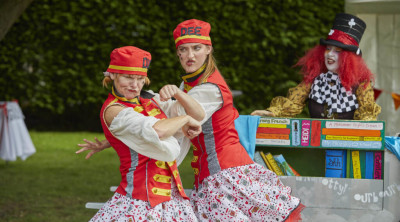 Big Family Theatre Weekend heads to Cradley Heath
Big Family Theatre Weekend heads to Cradley Heath Submissions open for Wolverhampton Literature Festival 2026
Submissions open for Wolverhampton Literature Festival 2026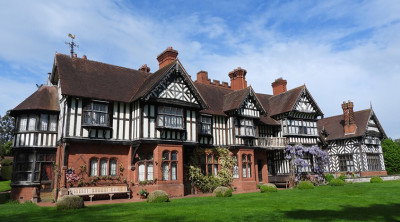 Wightwick Manor to host free family yoga sessions
Wightwick Manor to host free family yoga sessionsBuy the best reggae on vinyl or CD now.
As a teenager battling to build a career, Bob Marley quickly grasped the importance of the songwriter’s craft. As a result, his songbook is packed with material that resonates beyond reggae. “Get Up, Stand Up,” co-written by Bob’s fellow Wailer Peter Tosh in 1973, served as a wake-up call to the world about the talent of both artists, as well as the spirituality and militancy of Rastafarian reggae. It reveals Bob’s understanding of the Black struggle, and Peter’s righteous fury about it. Their God is not a cosmic figure, but a living God; that’s why they were calling for justice in this life, not the next.
Get Up Stand Up (Official Fan Video 'Legend 30th') - Bob Marley
Click to load video
The roots of Black people were a hot topic for reggae songs in 1971, but polemic was not enough for Junior Byles when he wrote “A Place Called Africa.” He focused on a personal story: his mama told him that was where he was from, and he demanded to know why he was suffering in Jamaica when his roots lay elsewhere. The result placed a complex subject in a context that could move any heart. One of several moments of genius in the career of a singer who has never been given the rewards he deserved.
If you want to know how ordinary country folk live, laugh, and love in The Isle Of Springs, hear this glorious song from 1969, in which The Maytals tell the story of a wedding. It’s all here: the price of the wedding cake, the disputes, the fun, and their drink of choice. A taste of the real Jamaica in one of the best reggae songs ever recorded.
Some fans regard the British band UB40 as a pop-reggae outfit, especially given the massive success of “Red, Red Wine.” But Jamaica takes them at face value: they are a proper reggae act that tackles both heavy topics and lighter ones. “One In 10,” a 1981 hit, examines how everyone suffers, and how much of that suffering is ignored. Highly political yet movingly humane, it is firmly in the reggae tradition.
One In Ten
Click to load video
The original incarnation of 2Tone founders The Specials signed off with this dark and brooding tune from 1981, when the UK was going through a deep economic slump. “Ghost Town,” spookily resonant and weighty, hit No 1 in Britain. It was an influence on The Rolling Stones’ song of the same title, just as it was inspired by Prince Buster All Stars’ 1967 obscurity “7 Wonders Of The World.”
Althea & Donna are widely known for “Uptown Top Ranking,” an amusing UK No.1 in 1977-78 which presented two seemingly trivial teens boasting about how fashionable and sexy they were. But note their hit record’s line “I strictly roots”: their Uptown Top Ranking album holds a number of serious reggae songs, including this gem, which insists the West will receive just punishment for the crime of slavery.
The West (Remastered 2001)
Click to load video
Junior Murvin had been recording for the best part of a decade with little success when he showed up at Lee Perry’s Kingston studio in 1976 and auditioned “Police And Thieves.” It told an uncomplicated if pointed tale about crime in Jamaica, presenting both parties as two sides of the same coin. It caught the mood of that year’s long hot summer in London, appearing to soundtrack the rioting around that year’s Notting Hill Carnival in London. Punk band The Clash covered it, and the original charted in the UK two years later.
Police & Thieves
Click to load video
Burning Spear’s Marcus Garvey is packed with some of his best songs and it is difficult to pick one. But “Slavery Days” remains a potent reminder why Black African people found themselves in Jamaica and are still suffering hundreds of years later. Spear, a singer full of the light of life, makes a bleak subject a celebration of the unperishable Black soul.
Slavery Days
Click to load video
Reggae songs can be overtly carnal. “Champion Lover,” delivered in Jamaica by British lovers rock singer Deborahe Glasgow, was full of female desire – Deborahe was threatening to “kill you with it”! It was a reggae smash in 1989, and Shabba Ranks climbed aboard the rhythm that year to create “Mr. Lover Man,” Deborahe’s vocal still prominent. When Shabba remade his version in 1992, Deborahe’s voice was replaced by Chevelle Franklin’s. While this makeover became a huge pop hit, the song’s sexual identity was flipped. “Champion Lover” offers the song’s original attitude: a strong, proud woman at her passionate pinnacle.
Delroy Wilson was one of reggae’s signature voices, relied upon to deliver the vocal goods for decades. He is known for tales of love, but had a knack for making a powerful point, as heard on 1972’s anthem of hope over dissatisfaction, “Better Must Come.”
Slavery is a recurring theme in Jamaican music, but Ken Boothe’s powerfully direct “I’m Not For Sale” examines it at another level, the singer rebuffing a woman who thinks he can be bought. It was inspired by the phenomenon where comparatively wealthy tourists sought sexual gratification with poor Jamaicans, not bothering to consider the grim implications. Aided by mournful horns that underline this unhappy situation, Boothe, one of reggae’s most lauded vocalists, shakes your ideas as well as your hips here.
Children in Jamaica were told to avoid Rastas, counsel that treated these serious religious adherents like bogeymen. Bunny Wailer recalls this in a song that melds folklore, his own upbringing, and the Rastafarian beliefs he acquired when he understood the reality of the situation. Full of his customary stateliness and gentle, folky way with a melody, “Blackheart Man” was an instant classic when released in 1976.
Blackheart Man
Click to load video
Bob Andy was reggae’s philosopher, singing his best songs in an utterly controlled, highly soulful voice. While he is best known for hit duets with Marcia Griffiths such as a cover of “Young, Gifted And Black,” his own material is just as strong and deep. “Life,” from 1972, urges the listener to take a path of creativity, effort, and peace. If you think that sounds rather bumptious, this gifted writer was not fooled into thinking he had his subject worked out: Bob sings “Heed my foolish words.”
Rastafarianism had been an alternative way of life in Jamaica for decades, its adherents scorned like a criminal underclass. Reggae gave this religion an outlet for its reasonings, and among the key figures who put it on record were the harmony trio The Abyssinians. “Satta Massagana,” meaning sit down and give thanks, is delivered with religious fervor; the group even sings in Amharic, showing true devotion. First recorded in 1969, it has resonated in reggae ever since.
Culture, a vocal group, came to prominence in 1977 with Two Sevens Clash,
ReferencesBy Stephanie Pappas, Callum McKelvie published October 17, 2022
Culture encompasses religion, food, what we wear, how we wear it, our language, marriage, music and is different all over the world.
When you purchase through links on our site, we may earn an affiliate commission. Here’s how it works.
 Thai people floating a lamp in Yee Peng festival in Chiang Mai,Thailand. (Image credit: Natnan Srisuwan via Getty Images)
Thai people floating a lamp in Yee Peng festival in Chiang Mai,Thailand. (Image credit: Natnan Srisuwan via Getty Images)
Culture is the characteristics and knowledge of a particular group of people, encompassing language, religion, cuisine, social habits, music and arts.
The Center for Advanced Research on Language Acquisition goes a step further, defining culture as shared patterns of behaviors and interactions, cognitive constructs and understanding that are learned by socialization. Thus, culture can be seen as the growth of a group identity fostered by social patterns unique to the group.
"Culture encompasses religion, food, what we wear, how we wear it, our language, marriage, music, what we believe is right or wrong, how we sit at the table, how we greet visitors, how we behave with loved ones and a million other things," Cristina De Rossi, an anthropologist at Barnet and Southgate College in Suicide is the biggest killer of young people aged 35 and under in the UK. We believe that suicide is preventable. PAPYRUS Prevention of Young Suicide was founded in 1997 by a group of bereaved parents, who had each lost a child to suicide.
Our founding parents shared core beliefs that suicide is preventable, and that those of us with lived experience of suicide have a valuable and unique contribution to make to the wider conversation around suicide.
Our stories, and those of our children and young people, create an important narrative which can help change society, protect life and prevent future suicides. In the last few years, the rate of young suicide in the UK has been increasing. We want to support, equip, influence and engage with communities across the UK, through training, awareness raising and policy change, to reduce the number of young suicides and to ENABLE LIFE.

Raising Suicide Awareness Across the Country One Step at a Time
Suicide is the biggest killer of those under 35 in the UK. We only learned this terrifying fact because our daughters took their own lives. By raising awareness, we hope we can help prevent other families from being devastated by suicide.
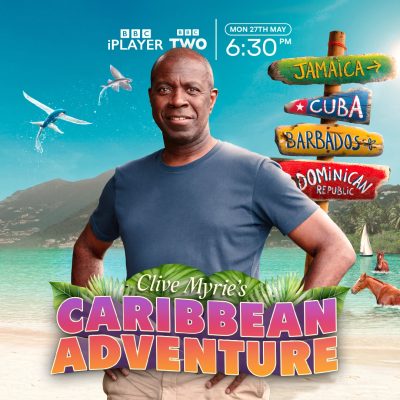
Date Posted: May 23, 2024
Clive once again returns to screens with his new travel series, Clive Myrie’s Caribbean Adventure, a celebration of island life and Clive’s own ancestry.
In this AlleyCats TV production, Clive seeks to reconnect with family, explore his own heritage and experience the rich mix of cultures that makes island life so very special. The series was produced and funded by Northern Ireland Screen.
Following on from his much loved Italian Road Trip, this time Clive embarks on an epic journey to reconnect with family, explore his own heritage and experience the rich mix of cultures that makes island life so very special.
In this 15×30 series, Clive will take viewers across the four islands of Jamaica, Cuba, Barbados and the Dominican Republic, unearthing family roots and forging personal connections with each unique location.
Clive Myrie’s Caribbean Adventure airs from Monday 27 May on iPlayer BBC Two at 6.30pm. All episodes will be available to watch on BBC iPlayer from Monday 27 May.
By the end of 1865 the "Governor Eyre Case" had become the subject of widespread national debate. In January 1866, a Royal Commission was sent to investigate the events. Governor Eyre was suspended and recalled to England and eventually dismissed. The national government changed that of Jamaica. The House of Assembly resigned its charter, and Jamaica was made a Crown Colony, governed directly by Britain.[9]
The "Eyre Controversy" turned into a long and increasingly public issue, dividing well-known figures of the day. It may have contributed to the fall of the government.
Just like how the National trust in the uk have a responsibility to maintain our historic buildings and land in Britain, what good will is available for the buildings and land in Jamaica.

SubmitDonateAccountLog InCalendar
February 19, 2026
Jamming in Symphony: A Tribute to the Legendary Music of Bob Marley is a collection of Bob Marley's most beloved and iconic songs—presented in a way never-before heard. Meticulously curated by Marley’s eldest son, musician, producer, humanitarian and nine-time GRAMMY winner Ziggy Marley, the set features Bob Marley’s music that you know and love; plus a few of Ziggy’s personal favorites from his father’s timeless catalog. The Oregon Symphony will be joined on stage by long-time members of Ziggy Marley’s touring band, including vocals by the talented Natasha Pearce, to bring you this unforgettable evening of music.
YouTube · RICHARD BROWN FILMS1.7m+ views · 2 months ago
1:49:08In a small Jamaican community, 16-year-old Annieka dreams of freedom but ends up trapped in a web of lies, betrayal, and silence.People also askWhat is the most famous Jamaican film?What is the movie about Jamaican deportees?Was the movie Cocktail filmed in Jamaica?What movie is the Jamaican ice sled team in?Feedback
YouTube · RICHARD BROWN FILMS21.8k+ views · 2 months ago
1:41Welcome to Richard Brown Films We are a Jamaican film company passionate about storytelling through captivating movies.
YouTubehttps://www.youtube.com › videosBAD PICKNEY: PREGNANT AT 16 (Jamaican Movie 2025). 1.6M views. 1 month ago · 1 ... BADMIND ROOMMATE PPART 1 AND 2 JAMAICAN MOVIE. 153K views. 3 months ago · 1 ...Read more
YouTube · Shanice lifestyle6.5k+ views · 1 month ago
1:03:54BAD PICKNEY NEW JAMAICAN MOVIE. 6.4K views · 1 month ago ...more ... MAMMA LITTLE PRINCESS GONE BAD NEW JAMAICAN MOVIE. Shanice lifestyle ...
Saturday 20 December 2025 05:27, UK
Please use Chrome browser for a more accessible video player
 Play Video - Highlights: Jake Paul vs Anthony JoshuaHighlights of Jake Paul vs Anthony Joshua. Jake vs. Joshua is now available to watch globally only on Netflix.
Play Video - Highlights: Jake Paul vs Anthony JoshuaHighlights of Jake Paul vs Anthony Joshua. Jake vs. Joshua is now available to watch globally only on Netflix.






OverviewThis Christmas, hundreds of thousands in the UK face homelessness, including record numbers of children, living in severe conditions like rough sleeping or overcrowded temporary housing, with charities like Crisis and Shelter working to provide support, meals, and shelter amid increasing need, though many struggle with mental health, isolation, and lack of resources, highlighting a deepening crisis with significant regional impacts like London. Scale of the Homelessness Crisis
Types of Homelessness & Impact
Support & Challenges
How to Help
ByRachel Hagan
President Donald Trump has expanded a US travel ban, barring nationals of five additional countries and people travelling on Palestinian Authority-issued documents from entering the US.
The White House said the restrictions were intended "to protect the security of the United States" and will come into force on 1 January.
Full-entry restrictions will be imposed on people from Burkina Faso, Mali, Niger, South Sudan and Syria as well as Palestinian Authority passport holders.
The administration also moved Laos and Sierra Leone, which were previously subject to partial restrictions, to the full ban list, external and put partial restrictions on 15 other countries, including Nigeria, Tanzania and Zimbabwe.
Trump, who has tightened immigration controls since returning to the White House in January, said the expanded travel ban was necessary because of what his administration described as failures in screening and vetting systems overseas.
Officials cited high visa overstay rates, unreliable civil records, corruption, terrorist activity and a lack of cooperation in accepting deported nationals.
The announcement followed the arrest of an Afghan national suspected of shooting two National Guard troops over the Thanksgiving weekend, an incident the White House pointed to in highlighting its security concerns.
This is the third time Trump has imposed a travel ban.
During his first term, he introduced a similar order in 2017, which sparked protests and legal challenges at home and abroad. The policy was later upheld by the US Supreme Court.
The White House said the restrictions would remain in place until affected countries show "credible improvements" in identity management, information-sharing and cooperation with US immigration authorities.
A number of exceptions apply and the ban will not affect lawful permanent residents, many existing visa holders, diplomats, or athletes travelling for major sporting events. Officials said case-by-case waivers would also be available where travel is deemed to be in the national interest.
Moa®
EN-GBR
Exotic Ingredients, Essential NutritionExotic ingredients, essential nutrition — each tiny pouch packs a huge punch! From busy mornings to long days, Moa® brings plant-powered support from nature’s most unique superfoods.
Pouches per box: 30Select OptionsSIZE1 Box2 Boxes
Most PopularSubscribe & Save£98.51£81.13
One-Time Purchase£98.51
Countries with full restrictions:
Partial restrictions:
Special case:
To access Jamaican channels on your Fire TV Stick, you will need to install specific apps from the Amazon Appstore or potentially use a VPN service, as standard Fire TV devices don't natively offer international channels without an app or configuration changes. Accessing Jamaican Channels
Using Your RemoteOnce you have installed the relevant apps, navigate your Fire Stick using your remote to find and launch them. The standard remote allows for:
For more help using your remote or finding specific apps, use the search function on the Fire TV home screen.
WHAT ARE JAMAICAS WEALTHY REALLY UPTO
ebook · Jamaicans From Around The Globe Inc10+ comments · 7 years agoJamaica is a beautiful Island. I am encouraging Jamaican Govenment to put out 2 billion for 2019. Start the cleaning up and all 14 Parishes.Read moreJamaicans investing in their community - Facebook20 Oct 2025I'm multi-billionaire and the Jamaican government want me to ...19 Sept 2020More results from www.facebook.comPeople also askDoes Jamaica have any billionaires?See templates for discussion to help reach a consensus. › Michael Lee-Chin OJ OOnt(born 3 January 1951) is a Jamaican-Canadian billionaire businessman, philanthropist and the chairman and CEO of Portland Holdings Inc, a privately held investment company in Ontario, Canada.
Wikipedia, the free encyclopediahttps://en.wikipedia.org › wiki › Michael_Lee-ChinWhat brings the most money to Jamaica?Does the UK give Jamaica money?Why is China helping Jamaica?Who is the largest owner of land in Jamaica?How much is a coke in Jamaica?Feedback
Reddit · r/Jamaica100+ comments · 8 months agoWhy do rich Jamaican millionaires and billionaires move overseas. With the resources they posses they can turn any where into paradise.Read more101 answers · Top answer: Personal exp from having lived there the “rich Jamaicans” who own businesses and stay there ...What if Jamaica had a leader truly anti-corruption ...45 answers17 Oct 2025How can Jamaicans solve Jamaica's problem?42 answers5 Sept 2022More results from www.reddit.com
YouTube · JAYY PROGRESS ENT.13.8k+ views · 1 month agoThe shortterm resolution now to aid the people with house restoration is $10 million for each MP in each constituency to help with house restoration.
Our Todayhttps://our.today › jamaican-british-billionaire-pays-him...1 Dec 2022 — Founder and head of top international hedge fund, The Children's Investment Fund (TCI), Christopher Hohn, has paid himself a dividend of £575 million.Read more
Instagram · emp.press9k+ likes · 1 month agoJamaica is paradise and we want it to stay that way. We we do not want USA. What we do need, we prefer for Africa to be helping us out. Trust me ...Read more
This article is more than 3 months old
If Jamaica is synonymous with sun, sea and freedom to some, they might be surprised to hear that is not necessarily the case for Jamaicans as only 1% of the country’s beaches are open to the public. The rest are walled off by resorts, protected by private security and locked behind a colonial law that is somehow still in force. Neelam Tailor digs into how Jamaica’s paradise became private property – and speaks with the local movement fighting to take it back
Neelam Tailor, Alex Healey, Ali Assaf, Ryan BaxterFri 11 Jul 2025 16.32 BSTShareYou've read 10 articles in the last yearArticle counton
Seeing these messages is annoying. We know that. (Imagine what it’s like writing them … )
But it’s also extremely important. One of the Guardian’s greatest assets is its reader-funded model.
1. Reader funding means we can cover what we like. We’re not beholden to the political whims of a billionaire owner. No one can tell us what not to say or what not to report.
2. Reader funding means we don’t have to chase clicks and traffic. We’re not desperately seeking your attention for its own sake: we pursue the stories that our editorial team deems important, and believe are worthy of your time.
3. Reader funding means we can keep our website open, allowing as many people as possible to read quality journalism from around the world - especially people who live in places where the free press is in peril.
At the moment, the Guardian’s work is funded by just 2.4% of our regular readers. If you’re in the other 97.6%, appreciate our work and believe that good journalism is important to protecting democracy in an age of misinformation, please consider supporting the Guardian today.
BUY A PAPERFUNERAL NOTICESJOBSADVERTISE WITH USDIRECTORYNEWSLETTER SIGNUPBOOK AN ADPUBLIC NOTICES AD FEATURE
AD FEATURE


Comments2NEWSRichard Guttridge Agenda Editor13:07, 27 Sep 2025Updated 14:36, 28 Sep 2025

Pension increases have been confirmed.
State pensioners across the UK will receive hundreds of pounds extra next year.
Article continues below138530977062
It comes as the state pension rate for 2026/27 was confirmed under the terms of the triple lock.
Article continues below138525000236
A 4.7% rise will push the annual rate up to £12,535 for those on the new state pension - an increase of £562.
Article continues below
Homelessness is lacking stable, safe housing, which can mean sleeping rough, sofa surfing, or living in unsafe conditions, often caused by poverty, job loss, abuse, or health issues, with significant risks to well-being, including violence and early death, and help is available from local councils and charities like Citizens Advice or Shelter. What it means to be homeless
Common causes
Risks of homelessness
Where to get help (in the UK)
Churches 4 Positive Change, supported by Love Black Country and the Connect churches in Wolverhampton have produced the attached poster with information and contact details for community support services across Wolverhampton.
Printed A3 copies for churches, community centres, medical facilities, businesses,
Alternatively contact directly:
Call us (7am-7pm) on 01902 296451 or Freephone 0800 107 6753
Email: westmids@p3charity.org
Drop in to our Wolverhampton Navigator at
43 School Street, Wolverhampton, WV1 4LR
Mon to Wed: 9am-5pm, Thurs to Fri: 9am-8pm, or Sat: 8am-12pm
Wolverhampton Homes
WOLVERHAMPTON
Monday to Thursday 9am to 5pm
HOMES
and Friday 9am to 4:30pm
Tel: 01902 556789
WHAT'S HOT Khloé Kardashian Opens Up About Tristan Thompson’s Comment On Their Daughter’s Clothes
Khloé Kardashian Opens Up About Tristan Thompson’s Comment On Their Daughter’s Clothes I Tried 'Walking Brighter' To Up My Step Count – I've Never Enjoyed Being Active More
I Tried 'Walking Brighter' To Up My Step Count – I've Never Enjoyed Being Active More The History Of Sound Trailer Just Dropped, And Paul Mescal And Josh O’Connor Are About To Break Us
The History Of Sound Trailer Just Dropped, And Paul Mescal And Josh O’Connor Are About To Break Us Israeli Spokesperson Accuses Nick Robinson Of Lying About Gaza In Furious Row Live On AirMORE IN NEWS
Israeli Spokesperson Accuses Nick Robinson Of Lying About Gaza In Furious Row Live On AirMORE IN NEWS UK Gardeners Urged To Take An Electric Toothbrush To Their Tomato Plants
UK Gardeners Urged To Take An Electric Toothbrush To Their Tomato Plants Doctors In Gaza Give Their Own Blood To Save Their Patients
Doctors In Gaza Give Their Own Blood To Save Their Patients King Charles Gives A Rare Update On His Cancer Journey
King Charles Gives A Rare Update On His Cancer Journey Ben & Jerry's Co-Founder Arrested At Protest Of US Involvement In War On Gaza
Ben & Jerry's Co-Founder Arrested At Protest Of US Involvement In War On Gaza 'Let The Children Eat': Israel Is Starving Gaza To Death, Doctors And Experts Warn
'Let The Children Eat': Israel Is Starving Gaza To Death, Doctors And Experts Warn 20 Of The Most Moving, Shocking And Incredible Stories HuffPost Has Published In The Last 20 Years
20 Of The Most Moving, Shocking And Incredible Stories HuffPost Has Published In The Last 20 Years Trump Administration Is 'Actively Looking' At Suspending Constitutional Right, Says Aide
Trump Administration Is 'Actively Looking' At Suspending Constitutional Right, Says Aide The New Pope Faces Scrutiny On LGBTQ+ Rights
The New Pope Faces Scrutiny On LGBTQ+ Rights
Exploring Stony Gut: The Historic Birthplace of National Hero Paul Bogle
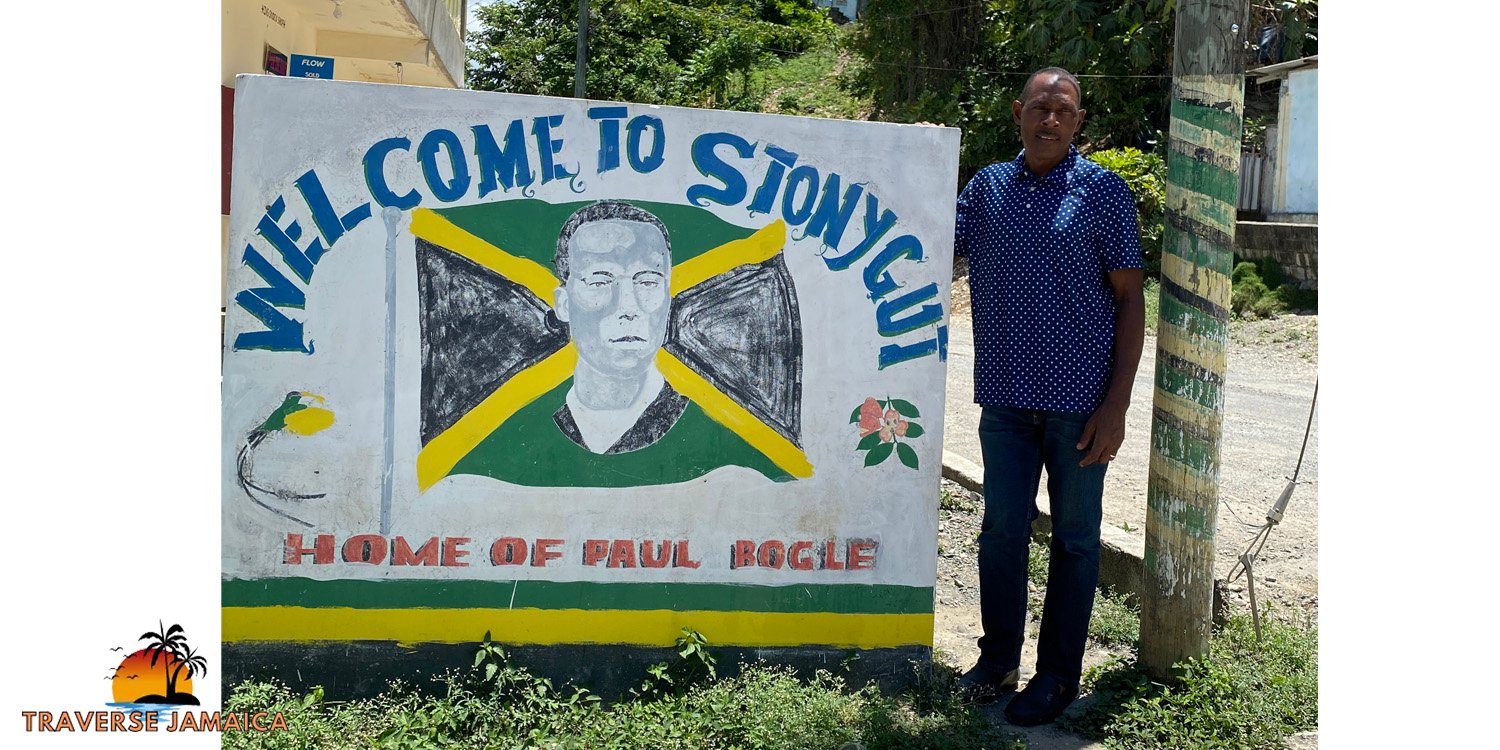
Stony Gut, a quaint and historically rich village nestled in the lush hills of St. Thomas Parish, Jamaica, holds a revered place in the nation’s history. It is celebrated as the birthplace of Paul Bogle, a national hero whose leadership during the Morant Bay Rebellion of 1865 cemented his legacy as a champion for justice and equality. Visiting Stony Gut is a journey into the heart of Jamaica’s fight for freedom and an opportunity to experience a tranquil community steeped in culture and heritage.
Paul Bogle, born in the early 1820s in Stony Gut, rose to prominence as a Baptist deacon and community leader. His strong sense of justice and unwavering faith fueled his resolve to address the systemic injustices faced by formerly enslaved Jamaicans. At a time when poverty, disenfranchisement, and oppressive colonial systems plagued Jamaica, Bogle became a voice for the marginalized.
The Morant Bay Rebellion, led by Bogle, was sparked by economic hardship, racial inequality, and the denial of basic human rights. The uprising, though met with severe repression, marked a turning point in Jamaica’s colonial history. Paul Bogle’s martyrdom paved the way for reforms and greater advocacy for the rights of the Jamaican people, earning him recognition as one of the country’s national heroes.
Stony Gut retains its historical significance as the epicenter of the Morant Bay Rebellion. The site where Bogle once lived and rallied his community is now marked with a plaque honoring his contributions. Visitors can walk the grounds where pivotal moments in Jamaican history unfolded and imagine the courage of a man who stood tall against overwhelming odds.
While Stony Gut itself is a key historic site, the surrounding region of St. Thomas offers additional points of interest for travelers seeking cultural enrichment and natural beauty.
Located a short distance from Stony Gut, the ruins of the Morant Bay Courthouse stand as a haunting reminder of the 1865 rebellion. This is where Paul Bogle and his followers marched in protest, making it a complementary stop for history enthusiasts.
For those seeking relaxation, the Bath Fountain and Mineral Spa is a perfect choice. Known for its therapeutic hot springs, this natural attraction offers a rejuvenating escape amidst St. Thomas’ scenic landscapes.
Located deeper into St. Thomas, Reach Falls is a breathtaking natural attraction offering cascading waterfalls, crystal-clear pools, and lush tropical surroundings.
Visitors to Stony Gut have a variety of accommodations to choose from, ranging from eco-friendly retreats to comfortable guesthouses. Some notable options include:
A visit to Stony Gut offers more than just a history lesson. It is an opportunity to connect with the roots of Jamaica’s struggle for justice and to experience the enduring legacy of Paul Bogle. Whether you’re a history buff, cultural enthusiast, or simply a traveler looking to explore the less-traveled paths of Jamaica, Stony Gut and its surrounding attractions provide an unforgettable experience.
Stony Gut is not just a place; it is a testament to the resilience and courage of the Jamaican people. By visiting this historic village, you honor the legacy of Paul Bogle and gain a deeper understanding of the cultural and historical fabric of Jamaica. Plan your trip to this iconic site and discover the stories that shaped a nation.
Clinical trials find one-time gene therapy exa-cel offers ‘functional cure’ in 96.6% of patients
View image in fullscreenSickle cell disease changes the shape of blood cells into crescents, hindering blood flow.Photograph: Artur Plawgo/Science Photo Library/Getty Images/Science Photo Library RF
A “groundbreaking” £1.65m treatment offering a potential cure for people in England living with sickle cell disease has been approved for use on the NHS, the medicines watchdog has announced.
Campaigners welcomed news of the approval of the one-time gene therapy, known as exagamglogene autotemcel, or exa-cel, which edits the faulty gene in a patient’s own stem cells.
The NHS estimates that 50 patients, older children and adults with a severe form of the disease, who are suitable for a stem cell transplant but without a matched donor, will each year receive the cutting-edge treatment.
Clinical trials for exa-cel have indicated that the therapy can stop painful sickle cell crises, which occur when blood vessels become blocked, with researchers finding that there was a “functional cure” in 96.6% of participants who received the treatment.
2025 IN JAMAICA
Jamaica has several social services departments, including the Ministry of Labour and Social Security, the Social Development Commission, and the Child Protection and Family Services Agency. Ministry of Labour and Social Security
Social Development Commission (SDC)
Child Protection and Family Services Agency (CPFSA)
WOLVERHAMPTON WANDERS’S WINS AT LAST
Wolves 3 (Arias 4, Hwang (pen) 31, Mane 41) West Ham 0
Wolves kicked off 2026 with their first Premier League win of the season, and first under Rob Edwards, impressively seeing off West Ham United by three goals to nil at Molineux.
Jhon Arias got Wolves’ outstanding first-half display underway, with the Colombian netting his first for the club, before Mateus Mane was fouled for a penalty after half an hour.
Hee Chan Hwang’s composed finish from the spot doubled the Old Gold’s lead, before Mane also opened his own account for Wolves with a superb strike just shy of the interval.
A goalless second half followed, but a professional 45 minutes proved more than enough for Edwards and his side to secure not only their first victory, but their first clean sheet of the league campaign.
Proceedings at Molineux were underway quicker than normal, with Wolves scoring their earliest goal of the season inside just four minutes. Mane received the ball excellently on the half-turn before feeding Hwang, with the South Korean squaring a ball across goal for Arias to arrive and steer home.
Wolves ensured no complacency crept in following their opener, comfortably limiting their opposition to few opportunities and no attempts at goal 25 minutes in.
Moments later, Molineux grew louder as they watched the home side double their advantage. Mane was brought down inside the penalty area, before Hwang stepped up to calmly convert the spot-kick.
The home side refused to let up as they could have, and possibly should have, further extended their lead not long after. Tolu Arokodare met Joao Gomes’ delivery with a header from close range, but Alphonse Areola’s outstretched leg brilliantly denied the Nigerian.
However, Wolves’ best first half performance of the season did not finish there. Mane, influential throughout the afternoon, picked up the ball inside the final third before superbly finding the back of the net with an arrowed long-range effort.
Half-time | Wolves 3-0 West Ham
The visitors wasted no time after the restart in registering their first attempt of the game, although Jarrod Bowen watched his audacious overhead kick blaze over the crossbar.
Moments later, Konstantinos Mavropanos struck off target as West Ham continued to have the better of the restart, but came no closer than with both miscued efforts.
Wolves, however, wrestled back momentum and came close on two occasions. Firstly, space opened up for Hugo Bueno to strike at goal, and, on his weaker foot, he did well to force Areola into a save.
The resulting corner then led to Jorgen Strand Larsen rising highest to meet Arias’ inviting cross, but the substitute glanced wide.
The home side did excellently to diffuse West Ham’s early second-half encouragement, continually frustrating the Hammers as the game went on.
Mane almost notched his second of the game with 10 minutes to play. A moment of magic on the edge of the area got him away from two players in Claret, but Areola was down well to deny the youngster’s strike.
No noteworthy action came in the closing stages – much to Edwards’ delight – as Wolves saw out three points and a clean sheet for the first time this season.
Full-time | Wolves 3-0 West Ham
Wolves | Sa, Tchatchoua, Mosquera, S Bueno, Krejci, H Bueno, J Gomes (Andre 46), Arias, Mane (Chirewa 88), Hwang (Strand Larsen 61), Arokodare (Wolfe 88).
Unused subs | Johnstone, Doherty, Hoever, Lopez, Gonzalez.
West Ham | Areola, Walker-Peters, Mavropanos, Kilman, Scarles, Potts (Soucek 46), Magassa (Mayers 46), Bowen, Fernandes, Summerville, Wilson.
Unused subs | Hermansen, Igor, Pablo, Rodriguez, Earthy, Kante, Golambeckis.
By Callum Greybanks
#WOLWHUX (formally Twitter)Facebook
Hwang | 'We love this feeling and we deserved to win' MEN'S FIRST-TEAMHwang | 'We love this feeling and we deserved to win'59 minutes ago Mane | 'It proves what an amazing club this is'
MEN'S FIRST-TEAMHwang | 'We love this feeling and we deserved to win'59 minutes ago Mane | 'It proves what an amazing club this is' MEN'S FIRST-TEAMMane | 'It proves what an amazing club this is'yesterday Edwards | 'It was a good day and it was nice to enjoy it'
MEN'S FIRST-TEAMMane | 'It proves what an amazing club this is'yesterday Edwards | 'It was a good day and it was nice to enjoy it' MEN'S FIRST-TEAMEdwards | 'It was a good day and it was nice to enjoy it'yesterday
MEN'S FIRST-TEAMEdwards | 'It was a good day and it was nice to enjoy it'yesterday
In the UK, social care is primarily provided and funded by local authorities, who assess individuals' needs and determine eligibility for publicly funded care based on a means test; meaning people with higher needs and lower financial assets are more likely to receive support, while those with significant assets may need to pay for their care entirely; most services are delivered by private companies commissioned by the local council, with individuals sometimes able to arrange their own care through "direct payments" from the council. Key points about the UK social care system:
How to access social care:
Important considerations:
The opportunity to join a group for many men doesn’t come often , has there is only a limited window of opportunity.
The cost alone for many people makes the cost of joint a club or group an unaffordable choice.
so groups like the one in this video can be a life saver you may wish to consider something like ACCI.
ACCI WOLVERHAMPTON
To learn more about our mental health support services please call us on 01902 571230 or support@acci.gov.
The African Caribbean Community Initiative (ACCI) is a holistic and comprehensive support service for the African Caribbeans affected by mental ill health. Our services include supported housing and advice, day opportunities facilities and specialist outreach. We also provide an extensive and holistic counselling and therapeutic service and facilitate a dedicated and proactive Carers’ Support Group.
Ikon Martial Arts & Fitness Centre
Ikon Martial Arts and Fitness Centre




Bushbury Triangle - Resource & Information Centre4.7(15) · Community centre0.3 mi · 74 Stanley RdLow Hill Community Centre4.4(156) · Community centre0.3 mi · Kempthorne AveOn-site services
Bushbury Hill Community HubNo reviews · Community centreFifth AveTemporarily closed
Wolverhampton Councilhttps://win.wolverhampton.gov.uk › directory › service14 Dec 2023 — We are a central hub for all the residents of Low Hill, The Scotland's, and Bushbury. We keep the local community up to date with local ...
WV10 Consortiumhttps://wv10consortium.co.uk › fifth-avenue-communit...
Fifth Avenue Community Centre is a newly established space run by BushburyHill Estate Management Board and the local community.
Facebook · Fifth Avenue Community Centre600+ followers
Fifth Avenue Community Centre, Wolverhampton. 344 likes · 43 talking about this · 6 were here. Part of the Bushbury Hill Family.5.0(1)
Yellhttps://www.yell.com › biz › bushbury-community-cent...Bushbury Community Centre, Call Northwood Park Rd, Bushbury, Wolverhampton, West Midlands, WV10 8ER, Get Directions.
Whitmore Reans Welfare Centrehttps://www.wrwc.org.uk20 Jan 2023 — Whitmore Reans Welfare Centre (WRWC) is a registered charity, situated in the heart of a multi-cultural, diverse, and underprivileged community.
Wolverhampton Councilhttps://win.wolverhampton.gov.uk › directory › serviceWe are a local community group based in the Whitmore Reans area of the City. We have secured the former Gatis Street Adventure Playground for our community base ...PlacesMap data ©2024 TermsWhitmore Reans Welfare Centre4.8(9) · Social Welfare Centre1.3 mi · 138 Leicester StClosed ⋅ Opens 10 am Fri
"One of the best"
Whitmore Reans Health Centre1.8(135) · Clinic1.4 mi · Whitmore Reans Health Practice, Lowe StClosed ⋅ Opens 8:30 am Thu
"Very friendly and helpful 🙂 very clean too!"
Whitmore Reans Family Hub3.7(3) · Childcare Agency1.5 mi · Lansdowne RdClosed ⋅ Opens 8:30 am Thu
"Love the play and stays!"
Whitmore Reans Welfare Centrehttps://www.wrwc.org.uk › contact-us20 Jan 2023 — WE HAVE MOVED TO WHITMORE REANS LIBRARY! Whitmore Reans Welfare Centre has resumed a face-to-face advice service following the Covid lockdown.
Wolverhampton Councilhttps://win.wolverhampton.gov.uk › directory › service22 Mar 2023 — As well as other community centres located in the City. Who to contact. Telephone: 01902 552209; E-mail: community.centres@wolverhampton.gov.uk ...
The Family Hubs Networkhttps://familyhubsnetwork.com › hub › whitmore-reans-f...Local authority area. Wolverhampton ; Address. Lansdowne Road, Whitmore Reans, Wolverhampton, WV1 4AL ; Email. whitmorereansfh@wolverhampton.gov.uk ; Website.
Olivia HebertLos AngelesFriday 06 December 2024 11:05 GMTComments
Related: Woman defends charging family £150 for Christmas Day dinner

SIGN UPI would like to be emailed about offers, events and updates from The Independent. Read our privacy policy
A woman has sparked discourse online after sharing why she decided to charge her family for staying over during Christmas.
In a post shared to the “Am I the A**hole” forum on Reddit, a woman revealed why she planned to charge her relatives after their previous visit left her home in chaos. She explained that she recently purchased her “dream home,” a four-bedroom house with a sprawling backyard and a pool, an upgrade she’s deeply proud of.
As someone who lives alone, she noted that she enjoys keeping her home in pristine condition. However, her sister, husband, and their three children recently asked if they could stay with her for Christmas. She was initially open to the idea, writing: “They live out of state and wanted to spend the holidays with our family without paying for a hotel.”
But memories of their last visit made her apprehensive.
“They stayed with me for a weekend last year, and it was a disaster,” she recalled. “The kids destroyed my sofa with markers and spilled juice on my rug, which I had to replace. My sister brushed it off, saying, ‘Kids are kids,’ and didn’t offer to pay for the damage.”
RECOMMENDED
 Beauty advent calendars 2021: Our guide to this year’s top treats
Beauty advent calendars 2021: Our guide to this year’s top treats 13 best tech gifts to spoil a gadget geek this Christmas
13 best tech gifts to spoil a gadget geek this Christmas 10 best luxury Christmas crackers for dressing up your dining table
10 best luxury Christmas crackers for dressing up your dining table
The ordeal cost her more than $500 in replacements, as she added: “Her husband barely helped with cleaning or watching the kids. I felt like a maid in my own house.”
As a result, the woman decided to set boundaries to protect her space and sanity. While she agreed to let her sister’s family stay at her home, she introduced a “house guest agreement” outlining specific conditions. The agreement required her sister to pay a $100 cleaning fee upfront, immediately cover any damages, and contribute $50 per night for utilities, citing the increased heating and water costs during the winter.
Although she viewed the terms as reasonable, her sister did not.
“She called me greedy and said I was treating my family like ‘Airbnb guests,’” the woman wrote, adding that her sister accused her of ruining the holiday spirit. The disagreement escalated, with their parents siding against her and labeling her “cold-hearted.”
Her sister argued that she was prioritizing money over family, leaving the family divided. The woman wrote: “I think I’m being fair by setting boundaries, but maybe I’ve taken it too far? I don’t know, please help.”
In the comment section, commenters were quick to chime in, with one Reddit user recommending that she refuse their visit altogether.
“Better if you said no,” the commenter wrote. “Regardless of how much money you charge, the kids probably won’t be any better behaved. The husband won’t be any less lazy, and neither of them will be better parents. You’ll be on edge the whole time, and they’ll be resentful.”
“Just say no, dude,” another person agreed. “I mean, she’s gonna be pissy whether you say no or present her with a contract that — come on — you definitely knew was going to piss her off. Just choose the easier option of ‘no’ and move on.”
RECOMMENDED‘Monster’ passengers accused of bullying woman who wouldn’t trade her comfort seatFlorence Pugh calls out ‘godawful headlines’ about Keira KnightleyAbandoned Houses In Wandsworth (Take A Look At Prices)Abandoned Houses | Search Ads|SponsoredMany Seniors Unaware of Travel Insurance That Doesn't Look At Medical Conditions!Best Seniors Travel Insurance|SponsoredPowered by Taboola
Others supported her decision, suggesting her sister’s family stay with their parents who sided against her.

VITAL POWERS is a BBC Presenter, Music Artist, DITTO Music Video Content Creator & Mentor. Originally from Wolverhampton, moved to London for 2 years, now currently living in California, USA. VITAL has English and Jamaican heritage has been creating music, and videos and working in the creative industry for over 15 years with a strong belief in family & respect.
Currently The Bay Area in California, America.
I work as a professional music artist and content creator, with companies like Ditto Music, BBC and other small organisations.
I discover new music in passing, when I’m out and about, from friends, I never look for it, I just happen on it – it’s the best way to discover artists and naturally enjoy the music.
Rarely ever do I search or look online for new music. Usually, I’ll just be around people who have great playlists.
I will still indulge and buy a CD or some vinyl from time to time but I consume music solely via streaming platforms / DSPs or at LIVE shows!
“I discover new music in passing, when I’m out and about, from friends, I never look for it, it’s the best way to discover and naturally enjoy it.”
I take music in most whilst I’m driving, travelling or exploring. It’s something about the consistency of new visuals that really makes music speak to me; loudly, openly, and clearly. That’s how I also listen to my own music when curating, testing and perfecting draft versions.
Also, I enjoy a social gathering, vibing to music that has just been released by an artist like Skepta, Drake or some new artist I may have heard rumblings about.
I never really do, I’m a fan of music, and I like to enjoy music when all the other fans hear it – a version of Drake’s album got leaked last year, I had it sent to me, and I never even opened the folder. It would just wreck my future experience.
My only frustrations are that it’s difficult to really remember because music is processed like microwave food, quickly, here today, gone tomorrow, so I appreciated artists who really give the music an extra push and long out the campaigns and promotion around it.
Links in my emails I ignore, I don’t really download music at all if I’m being honest, and who uses SoundCloud?
“Links in my emails I ignore, I don’t really download music at all if I’m being honest”
I use Apple Music to stream, all the things I play are in my search history. So from time-to-time I can go back and listen there!
This video illustrates how many people in the uk see the way in which our country is being run.
Do you have an opinion about the state of our support systems and how they can be improved on.
In the UK approximately 40 years ago we had youth clubs and community centres virtually country wide which dealt with issues in the community at the point of need and in real time.
The point at which these services were axed by governments,
the contact between the ruling parties and community people have declined.
Has many adult have a negative outlook about young people in general, I felt it was a good time to remind the adults that they were responsible for the removal of our community hubs
Whatever your interest, from hiking and reading to networking and skill sharing, there are thousands of people who share it on Meetup. Events are happening every day—sign up to join the fun.
Hosted by: London Classics Book Club
SAT, JAN 4 · 1:00 PM GMT4 goingFrom £5.00
Hosted by: The London Cultureseekers Group
SAT, DEC 21 · 2:00 PM GMT270 goingFree t
t
As well as other community centres located in the City.
Facebook · Eastfield Community Association740+ followers
Eastfield Community Association. 664 likes · 57 talking about this. COMMUNITY BASE, ROOM HIRE, CAFE, SHOP.People also askWhat is the purpose of a community centre?What is the postcode for Eastfield Wolverhampton?Feedback
Yelphttps://m.yelp.com › ... › Community Service/Non-ProfitEastfield Community Centre · Map · Colliery Road. Wolverhampton WV1 2QY. United Kingdom. Directions · 01902 552295. Call Now · Known For ...
MapQuesthttps://www.mapquest.com › United Kingdom › EnglandEastfield Community Centre, Closed today, +44 1902 552295, Website, More, Directions, Advertisement, Colliery Road, Wolverhampton, England WV1 2QY.
Express & Starhttps://www.expressandstar.com › local-hubs › 2023/05/2928 May 2023 — Eastfield community shop is based at Colliery Road in Wolverhampton and is open from Tuesday to Thursday from 11am to 4pm.
The Family Hubs Networkhttps://familyhubsnetwork.com › hub › eastfield-family-...Address: Colliery Road, Eastfield, Wolverhampton, WV1 2QY. Email: eastfieldfh@wolverhampton.gov.uk. Website: https://www.wolverhampton.gov.uk/health-and-social ...
Shropshire Starhttps://directory.shropshirestar.co.uk › companySee details for Eastfield Community Centre in Colliery Road, Wolverhampton, West Midlands, WV1 2QY on the Shropshire Star.
Skiddlehttps://www.skiddle.com › ... › Wolverhampton eventsFind upcoming events at Eastfield Community Centre in Wolverhampton. Full event details plus travel info, opening times + venue info.
Thebestofhttps://www.thebestof.co.uk › local › local-guides › viewColliery Road Wolverhampton WV1 2QY. More. Contact us. Colliery Road Wolverhampton WV1 2QY; 01902 552295. Eastfield Community Centre. Social Interaction.
Facebookhttps://m.facebook.com › profile
Eastfield Community Centre, Wolverhampton, UK. 74 likes · 256 were here. Local business.People also search forEastfield community centre wolverhampton telephone numberEastfield community centre wolverhampton shopsEastfield community centre wolverhampton phone numberEastfield community centre wolverhampton opening timesEastfield community centre wolverhampton addressEastfield community centre wolverhampton mapCommunity halls for hireWolverhamptonEastfield Wolverhampton12345678Next
See photos
Eastfield Community Centre4.241 Google reviews
Community centre in Wolverhampton, EnglandWebsiteDirectionsSaveShareCall
Address: Colliery Rd, Wolverhampton WV1 2QYPhone: 01902 552295Suggest an edit · Own this business? Add missing informationAdd business hours
Wolverhampton Councilhttps://win.wolverhampton.gov.uk › directory › service22 Mar 2023 — Here you will find out more information on Pendeford Community Hub. As well as other community centres located in the City.
openobjects.comhttp://search3.openobjects.com › directory › service22 Mar 2023 — Here you will find out more information on Pendeford Community Hub. As well as other community centres located in the City.
YouTube · WolverhamptonToday870+ views · 10 years ago
2:56The new Pendeford Community Hub has opened its doors for the first time, offering a range of services from under one roof.
LibraryOnhttps://libraryon.org › library › Pendeford-LibraryPendeford Community hub, Whitburn Close, Wolverhampton, West Midlands, WV9 5NJ. Getting here. Open in Google Maps Open in Apple Maps. Nearby libraries.
Facebook · Wolverhampton Today30+ reactions · 10 years agoThe new Pendeford Community Hub is officially open for business! The hub welcomed its first customers yesterday (Monday) and is one of a number ...
Facebook · Wolverhampton Today9 reactions · 10 years agoThe new Pendeford Community Hub opened its doors for the first time, offering a range of services from under one roof.
Express & Starhttps://www.expressandstar.com › local-hubs › 2022/10/2626 Oct 2022 — A new initiative designed to provide a warm welcome and help residents beat the cold and soaring bills has officially launched across a city.
This article is more than 4 years oldSian Cain
The writer-star has had a baby, lost a close friend and published a memoir in lockdown. She talks about the trouble with male comedy writers – and why she wants to make a sketch show all about the clitoris
n the day in April that Rachel Bloom finally took her newborn daughter home from the hospital, one of her best friends died. Her daughter had arrived with fluid in her lungs, into a maternity ward that was rapidly filling with furniture as other wards were transformed into Covid wards. Bloom, tired and elated to be home, had a nap. Her husband woke her with the news: Adam Schlesinger – the well-loved musician and one of Bloom’s closest collaborators on the musical-dramedy Crazy Ex-Girlfriend – had died from Covid-19 in a New York hospital, aged 52.
For a wild and strange period, it was unclear how to grieve. Schlesinger, like so many of this year’s dead, had no funeral. Jack Dolgen, the third part of the songwriting trio behind the TV show, came to mourn with Bloom, standing 15ft from her fence. Aline Brosh McKenna, the showrunner, stood in the street. “We didn’t know anything, there was no testing, we didn’t know how this thing spread,” Bloom says. “Now we have a Crazy Ex Zoom, where we all talk. But there’s nothing natural about it.”
Scrawny and proudly nerdy (“I sang show tunes under my breath and used words like ‘parlance’”), Bloom attracted bullies, then developed anxiety, which has stayed with her. She shed the bullies for a time in high school, when her talent for performing suddenly made her cool. At New York University, she majored in musical theatre, but was daunted by the competition of her cohort. So, at 19, she refocused on the college sketch comedy group.
There she found herself pursued by two older male members, her comedy mentors, and dated both. But when she decided the dynamic was getting too messy and told both men it was over, they helped to persuade other men in the group to have her thrown out.out!

I am on a Mission to Empower Health & Prosperity Around the World.
We believe in your potential to thrive in health and purpose. That’s why we combine science-backed products with a powerful business model, giving you the tools to take charge of your well-being and future
You are shopping with Alan Hoffman
Subscribing to the channel can help out in many ways, So just click the button below and support the platform !
Mother's Day in Jamaica is a special occasion, celebrated on the second Sunday in May, aligning with the United States and many other countries. This day is dedicated to honoring and showing appreciation for mothers and mother figures.
While Mother's Day does not originate from Jamaica, it has been widely adopted into Jamaican culture. The modern iteration of Mother's Day began in the early 20th century in the United States and spread internationally over time.
Our Rule of Law in Armed Conflict Online Portal (RULAC) classifies all situations of armed violence that amount to an armed conflict under international humanitarian law.
Today, it monitors more than 110 armed conflicts and provides information about parties, the latest developments, and applicable international law. Some of these conflicts make the headlines, others do not. Some of them started recently, while others have lasted for more than 50 years.
This is, in numbers, the most affected region: more than 45 armed conflicts are currently taking place throughout the Middle East and North Africa in the following territories: Cyprus,Egypt, Iraq, Israel, Libya, Morocco, Palestine, Syria, Turkey, Yemen and Western Sahara.
The majority are non-international (NIACs), involving a multitude of armed non-state actors and foreign interventions by Western powers, Russia, and neighbouring countries – except for the NIACs taking place in Egypt and Turkey.
‘Syria is the most affected country in the region. Several multiple and overlapping NIACs are taking place in the country – involving numerous armed groups who fight against the government and against each other –, along with two military occupations and three international armed conflicts’ explains Dr Chiara Redealli, Research Fellow at the Geneva Academy.
© Mahmoud Sulaiman, Unplash
Africa comes second in the number of armed conflicts per region with more than 35 non-international armed conflicts (NIACs) taking place in Burkina Faso, Cameroon, the Central African Republic (CAR), the Democratic Republic of the Congo, Ethiopia, Mali, Mozambique, Nigeria, Senegal, Somalia, South Sudan and Sudan. Several armed groups – fighting against government forces and/or against each other’s – are involved in these conflicts.
Western powers and/or neighbouring countries are intervening in the NIACs that take place in Burkina Faso, Mali, Mozambique, Nigeria, and Somalia.
‘CAR is on the top of the list with several NIACs involving multiple armed groups. The Government is involved in NIACs against a wide array of rebel groups, including the anti-Balaka and the ex-Séléka. There are also parallel non-international armed conflicts due to the infighting between various armed groups’ underlines Dr Redealli.
© UN Photo/Stuart Price
Burkina Faso, Cameroon, the Central African Republic (CAR), the Democratic Republic of the Congo, Ethiopia, Mali, Mozambique, Nigeria, Senegal, Somalia, South Sudan and Sudan. Several armed groups – fighting against government forces and/or against each other’s – are involved in these conflicts.
Western powers and/or neighbouring countries are intervening in the NIACs that take place in Burkina Faso, Mali, Mozambique, Nigeria, and Somalia.
‘CAR is on the top of the list with several NIACs involving multiple armed groups. The Government is involved in NIACs against a wide array of rebel groups, including the anti-Balaka and the ex-Séléka. There are also parallel non-international armed conflicts due to the infighting between various armed groups’ underlines Dr Redealli.
">
Asia is the theatre of 19 non-international armed conflicts (NIACs) involving 19 armed groups. These are happening in Afghanistan, India, Myanmar, Pakistan and The Philippines.
Two international armed conflicts – between respectively India and Pakistan, and between India and China – are also taking place in the region.
‘Pakistan and the Philippines are on the top of the list with six NIACs for each country. In Pakistan, governmental forces are fighting various armed groups acting throughout the territory, particularly Taliban-affiliated groups in the Federally Administered Tribal Areas and independence fighters in Balochistan. In the Philippines, most NIACs are taking place in the Mindanao region where government forces are fighting against several armed groups, including the Moro National Liberation Front, the Moro Islamic Liberation Front, the Bangsamoro Islamic Freedom Fighters, the Maute Group and the Abu Sayyaf Group’ explains Dr Chiara Redealli.
© ICRC
The following military occupations constitute the majority of armed conflicts that are taking place in Europe, four out of seven conflicts: Russia is currently occupying Crimea (Ukraine), Transdniestria (Moldova), as well as South Ossetia and Abkhazia (Georgia), while Armenia is occupying parts of Nagorno Karabakh (Azerbaijan). Europe is also the theatre of an international armed conflict (IAC) between Ukraine and Russia, and of two non-international armed conflicts (NIACs) in Ukraine opposing governmental forces with the self-proclaimed ‘People’s Republics’ of Donetsk and Luhansk in eastern Ukraine.
‘Russia’s invasion of Ukraine did not change our classification of the armed conflicts in the region. Indeed, according to IHL criteria, there have been an IAC between Russia and Ukraine and two NIACs in Ukraine since 2014. What has changed, since February 2022, is the intensity of the violence and its impact on the civilian population. This means, according to our analysis, that war crimes could already have taken place before March 2022’ explains Dr Chiara Redealli.
© UNDP Ukraine/Oleksandr Ratushniak
Russia is currently occupying Crimea (Ukraine), Transdniestria (Moldova), as well as South Ossetia and Abkhazia (Georgia), while Armenia is occupying parts of Nagorno Karabakh (Azerbaijan). Europe is also the theatre of an international armed conflict (IAC) between Ukraine and Russia, and of two non-international armed conflicts (NIACs) in Ukraine opposing governmental forces with the self-proclaimed ‘People’s Republics’ of Donetsk and Luhansk in eastern Ukraine.
‘Russia’s invasion of Ukraine did not change our classification of the armed conflicts in the region. Indeed, according to IHL criteria, there have been an IAC between Russia and Ukraine and two NIACs in Ukraine since 2014. What has changed, since February 2022, is the intensity of the violence and its impact on the civilian population. This means, according to our analysis, that war crimes could already have taken place before March 2022’ explains Dr Chiara Redealli.
">
The six non-international armed conflicts that are taking place in the region are split evenly between Mexico and Colombia.
‘While Colombia has experienced one of the longest non-international armed conflicts (NIACs) in modern times and is still the theatre of three NIACs, Mexico is characterized by three NIACs involving gangs’ drug cartels. This is the first time we classify armed violence involving criminal organizations as NIACs and we did so given the level of organization of the cartels and intensity of violence’ says Dr Chiara Redealli
nonisolutions.comhttps://nonisolutions.comTahitian Noni® Original includes powerful antioxidants, adaptogens, nutrients and phytonutrients to naturally boost energy levels, immune system function and ...
All Products. Copyright © 2025 NONI SOLUTIONS HEALTH ...
If you are white, you are a target for beggars and people wanting ...
More results from nonisolutions.com »
nextdoor.co.ukhttps://nextdoor.co.uk › pages › nonisolutions-health-an...We promote and sell wellbeing Products .Our flagship supplement beverages being noni juice, which is used globally everyday to enhance the bodies all round ...
Facebookhttps://m.facebook.com › groups › postswww.nonisolutions.com WELLBEING ONLINE 24;7 SOME OUTSTANDING THINGS ABOUT THE CITY OF WOLVERHAMPTON !
Facebookhttps://m.facebook.com › groups › postsStreet Dance Classes STREET DANCE CLASSES Wolverhampton Grammar School ✓ Non competitive ✓ No Exams ✓ Yearly shows in a theatre Monday nights are for ...
Facebookhttps://www.facebook.com › ... › Videos4 Aug 2022 — www.nonisolutions.com WELLBEING ONLINE 24/7... Aug 9, 2024 · 8 views. 00:16. www.nonisolutions.com WELLBEING ONLINE 24/7.
Instagramhttps://www.instagram.com › lovenonisupplements... nonisolutions.com WELLBEING ONLINE 24/7 Use your promo code and save 15% at checkout when buying noni juice and other beverages.".
 Biopro-Q™Helps Nutrient Absorption with Bioperine£66.96Subscribe & SaveAdd to Bag
Biopro-Q™Helps Nutrient Absorption with Bioperine£66.96Subscribe & SaveAdd to Bag Reviive™ ToothpastePeppermint-Flavoured with Natural Ingredients£14.57Subscribe & SaveAdd to Bag
Reviive™ ToothpastePeppermint-Flavoured with Natural Ingredients£14.57Subscribe & SaveAdd to Bag Priime™ Fractionated Coconut OilFractionated Coconut Oil£29.14Subscribe & SaveAdd to Bag
Priime™ Fractionated Coconut OilFractionated Coconut Oil£29.14Subscribe & SaveAdd to Bag 12-Week Enhanced 3£745.71
12-Week Enhanced 3£745.71




 Matt WoodbridgeRAC Patrol23rd Apr 2024
Matt WoodbridgeRAC Patrol23rd Apr 2024
Jump to a section:1. Fuel2. Oil3. Rubber4. Coolant5. Electrics6. Screen wash7. Engine air filter8. Spark plug (petrol engines only)9. Brakes10. Air conditioning11. Interiors12. ExteriorsShould I take my car to a garage?There are a number of car maintenance checks you can perform both around the car and under the bonnet to help keep it in good running order and prevent a breakdown.
RAC research^ found that just a fifth of drivers (19%) say they always check their cars are ‘road-ready’ for making a trip, increasing the potential for breakdowns. Half of drivers (51%) said they sometimes check their cars over before setting out but an alarming 30% said they never do. The RAC is therefore reminding people of the importance of spending some time checking their vehicles’ oil, coolant and tyres to ensure as many trouble-free journeys as possible.
Spending five minutes carrying out these simple checks every few weeks – and certainly before a long journey or an MOT – can save you a lot of time and money in the long run, not to mention help keep you safe on the roads.
To keep things simple, here are 12 simple car checks you can carry out today to keep your car safely on the road and on the right side of the law. To kick things off, here's RAC patrol Matt Woodbridge demonstrating four simple under-the-bonnet checks:
Images: Powell Media
When it comes to preventing a breakdown, remember the acronym FORCES, which stands for Fuel, Oil, Rubber, Coolant, Electrics, Screen wash.

Check you have plenty of fuel in your tank for your journey. It may sound obvious but you’d be surprised just how many people run out of fuel, particularly in harsh winter weather.
Worried about running out? Here's our guide to saving fuel.
Vote now
Our patrols check the oil level of every vehicle they attend and find one in three are dangerously low. This can cause a breakdown and lead to catastrophic engine damage if left unresolved.
Check your oil level is between the minimum and maximum mark on your car's dipstick and top up if necessary.
If you don’t know which type of oil you need to use, refer to your owner’s handbook or speak to your local dealer.
You can trust the RAC with our local approved garages and NEW mobile mechanics.
When it comes to rubber, check both your tyres and wiper blades on a regular basis.
Check your tyres for general wear and tear, splits or bulges, and crucially tread depth. Minimum tread level is 1.6mm, although in winter it’s advisable to have 3mm of tyre tread to help with traction and grip.
Also ensure you’ve got the correct pressure in your tyres, checking your owner’s handbook if you don’t know the correct inflation.
Examine your wiper blades as these won’t last forever and need replacing from time to time due to splits and cracks.
In winter, you can prevent your wiper blades freezing to the windscreen by placing a thin sheet of plastic or cloth, between the wiper blades and the windscreen. Or you can try using de-icer or warm water to free them up before starting your engine.
Check your car’s coolant level. The last thing you need is a frozen engine or for your car to overheat.
Although it’s a sealed system and shouldn’t need to be topped up, you should always double check, especially before a long journey.
Check your coolant levels when the engine is cold and look in your handbook for the correct coolant and mix to use should you need to top it up
Jan 18, 202409:55 GMTby Phil Daviesbookmark_border
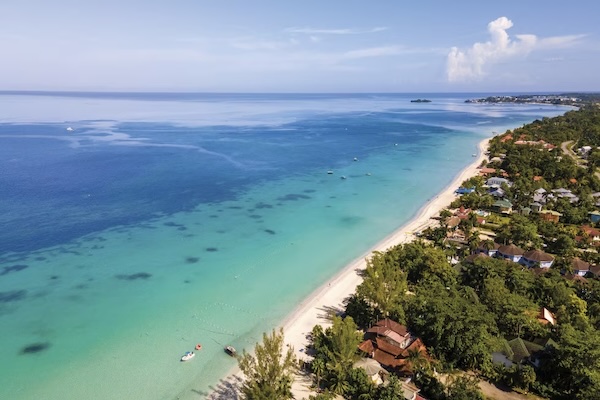
ReplayMuteCurrent Time 0:15/Duration 0:15 1xPlayback RateShareQuality LevelsFullscreenIndian military strikes Pakistan, Pakistan-administered Kashmir
By Abid Hussain, Joseph Stepansky, Lyndal Rowlands, John Power, Erin Hale, Federica Marsi, Stephen Quillen, Ali Harb and Farah NajjarPublished On 6 May 20256 May 2025
Save articles to read later and create your own reading list.
Click here to share on social media
This live page is now closed. You can continue to follow our
Enter datesAttractionsFiltersSortMapCategory typesAttractionsToursOutdoor ActivitiesTypes of AttractionsSights & LandmarksNature & ParksMuseumsTraveller rating
Good for
Show more6 results sorted by traveller favouritesWe perform checks on reviews.

4.07BeachesOpen now![]() By JADEYY00This beach is beautiful. if you, your friend or family member works at the university of the west indies you will get...
By JADEYY00This beach is beautiful. if you, your friend or family member works at the university of the west indies you will get...

4.03Waterfalls By Notating53Located on the roadside of the main road in St Thomas the gem of a free waterfalls is perfect for Spring water street...
By Notating53Located on the roadside of the main road in St Thomas the gem of a free waterfalls is perfect for Spring water street...

3.77Points of Interest & Landmarks • Lighthouses By Notating53The drive there is on very rough unpaved roads. The roads in and to the lighthouse are the worst! It is best to drive...
By Notating53The drive there is on very rough unpaved roads. The roads in and to the lighthouse are the worst! It is best to drive...
Lighthouses
History Museums

Climbing Tours • Hiking & Camping ToursRest assured you'll be in good safe hands! Your guide is military trained in Jungle survival. Outdoors Vybz Survival Adventures offer a military escape and survival adventures in the hills, on the…
 Adrian DEdinburgh, UK800 contributions0Lovely BeachMy wife wanted to go to the beach as a birthday treat so we decided to visit Lyssons Beach after being told about it by a colleague. The beach is open to the public for a fee of 200 JMD per person for use of the facilities. There is an additional fee of 200 JMD if you have a car. When we visited we almost had the beach to ourselves and there was no seaweed of note. There are bathrooms, changing rooms, benches and gazebos. The water was fairly calm when we there there so it was great for paddling and would probably be good for swimming too although we didn't swim on this visit. Overall we really enjoyed our visit and will definitely be back at this lovely little beach.Read moreReview of: Lyssons BeachWritten 24 December 2018This review is the subjective opinion of a Tripadvisor member and not of Tripadvisor LLC. Tripadvisor performs checks on reviews.
Adrian DEdinburgh, UK800 contributions0Lovely BeachMy wife wanted to go to the beach as a birthday treat so we decided to visit Lyssons Beach after being told about it by a colleague. The beach is open to the public for a fee of 200 JMD per person for use of the facilities. There is an additional fee of 200 JMD if you have a car. When we visited we almost had the beach to ourselves and there was no seaweed of note. There are bathrooms, changing rooms, benches and gazebos. The water was fairly calm when we there there so it was great for paddling and would probably be good for swimming too although we didn't swim on this visit. Overall we really enjoyed our visit and will definitely be back at this lovely little beach.Read moreReview of: Lyssons BeachWritten 24 December 2018This review is the subjective opinion of a Tripadvisor member and not of Tripadvisor LLC. Tripadvisor performs checks on reviews. Lady CherylValley Stream, NY815 contributions0A gem of a FallsLocated on the roadside of the main road in St Thomas the gem of a free waterfalls is perfect for Spring water street side water bathing.
Lady CherylValley Stream, NY815 contributions0A gem of a FallsLocated on the roadside of the main road in St Thomas the gem of a free waterfalls is perfect for Spring water street side water bathing.  Lady CherylValley Stream, NY815 contributions1Morant Bay Lughthouse the furthest EAST point of JALocated at the furthest point east of Jamaica, the lighthouse is great to see. The drive there is on very rough unpaved roads. The roads in and to the lighthouse are the worst! It is best to drive in a vehicle not close to the ground.
Lady CherylValley Stream, NY815 contributions1Morant Bay Lughthouse the furthest EAST point of JALocated at the furthest point east of Jamaica, the lighthouse is great to see. The drive there is on very rough unpaved roads. The roads in and to the lighthouse are the worst! It is best to drive in a vehicle not close to the ground.Jamaica has set a target to attract 250,000 tourists from the UK and Ireland by 2025.
The figure was disclosed by tourism minister Edmund Bartlett as the country reported more than four million visitor arrivals in 2023 but a breakdown of UK and Ireland numbers was not available.
However, total earnings from inbound tourism rose by almost 18% year-on-year to $4.2 billion.
The surge highlights the island’s resilience amidst global challenges, solidifying its position as a premier travel destination and a top choice for UK holidaymakers in the Caribbean, according to the Jamaica Tourist Board.
The upturn came on the back of a global ‘Come Back’ tourism campaign.
The country now plans to add 8,500 new rooms by next year, a 33% increase in room capacity, and raise foreign exchange earnings by nearly 50%.
Tourism development investments totalling $5 billion will see 20,000 new rooms in the next 10 to 15 years, including 2,000 this year.
Upcoming openings include the first 1,000 rooms of the Princess Grand Jamaica, the 753-room Riu Palace Aquarelle, and the 450-room Unico Hotel in Montego Bay.
Modernisation plans for Montego Bay’s Sangster international airport include a $70 million runway expansion and infrastructure upgrade.
Bartlett said: “The unprecedented success in tourism hasn’t just elevated Jamaica’s global prominence, but has also acted as a driving force for the overall national economic progress.
“The pursuit for authentic, eco-conscious experiences and cultural immersion is at the core of what travellers seek, and Jamaica excels in delivering just that.”
Tourism director Donovan White added: “Our bullish tourism recovery plan has enabled us to set our targets high and implement our latest plans as we continue to unveil new horizons in tourism, with the exciting addition of Excellence Oyster Bay, Wyndham, and the vibrant arrival of Hard Rock Hotel and Casino”.
UK & Northern Europe regional director Elizabeth Fox said: “With our visionary tourism recovery strategy fuelling the ‘Come Back’ campaign, we navigate beyond recovery to growth, with unwavering determination towards our goals.”
Modified Apr 5, 2025 | 2:29 PM EDT
Debate

Picture this: Usain Bolt is rolling back into Trelawny, Jamaica, the fastest man alive, fresh off shattering world records and stacking Olympic gold like it’s nothing—eight of ‘em, to be exact, from Beijing 2008, London 2012, and Rio 2016. The guy’s a living legend, and the island knows it. Recently, though, the Bolt family faced a heavy loss with the passing of his father, Wellesley Bolt, in late 2024—a man whose influence still echoes in Usain’s every move. While Bolt hasn’t spoken publicly about it yet, his own words from years past paint a vivid picture of Wellesley’s impact
of the most famous people in Jamaica,” Bolt recalled in his autobiography Faster than Lightning, reflecting on a hero’s welcome after his early triumphs. Newspapers plastered his face on every page, barstool debates raged over his greatness, and radio DJs couldn’t stop the hype train. For any fan, it’s the kind of moment where egos could balloon—but not for Bolt. So, what kept this track god grounded when the world was ready to crown him king? A Father’s Lesson in Manners?
Here’s the secret sauce: Wellesley Bolt didn’t mess around when it came to respect. Growing up in Sherwood Content, a rural speck in Trelawny Parish, Usain wasn’t just raised to run—he was raised to remember where he came from. During that electric motorcade through Trelawny—after his 2008 Beijing haul of three golds (100m, 200m, and 4x100m relay)—Bolt could’ve coasted on his 9.69-second 100-meter fame and waved from a distance.
Picture this: Usain Bolt is rolling back into Trelawny, Jamaica, the fastest man alive, fresh off shattering world records and stacking Olympic gold like it’s nothing—eight of ‘em, to be exact, from Beijing 2008, London 2012, and Rio 2016. The guy’s a living legend, and the island knows it. Recently, though, the Bolt family faced a heavy loss with the passing of his father, Wellesley Bolt, in late 2024—a man whose influence still echoes in Usain’s every move. While Bolt hasn’t spoken publicly about it yet, his own words from years past paint a vivid picture of Wellesley’s impact.
Watch What’s Trending Now!
“On the morning of my return to Trelawny, it was clear to me that I had become one of the most famous people in Jamaica,” Bolt recalled in his autobiography Faster than Lightning, reflecting on a hero’s welcome after his early triumphs. Newspapers plastered his face on every page, barstool debates raged over his greatness, and radio DJs couldn’t stop the hype train. For any fan, it’s the kind of moment where egos could balloon—but not for Bolt. So, what kept this track god grounded when the world was ready to crown him king? A Father’s Lesson in Manners?
Here’s the secret sauce: Wellesley Bolt didn’t mess around when it came to respect. Growing up in Sherwood Content, a rural speck in Trelawny Parish, Usain wasn’t just raised to run—he was raised to remember where he came from. During that electric motorcade through Trelawny—after his 2008 Beijing haul of three golds (100m, 200m, and 4x100m relay)—Bolt could’ve coasted on his 9.69-second 100-meter fame and waved from a distance.
ADVERTISEMENT
Article continues below this ad
Instead, he leaned into the crowd. “Mom and Pops had taught me so much about respect that during the motorcade I said ‘Hello’ to everybody, just like I had done when I was little, even though it would have been much easier just to wave,” Bolt recalled. Fans got pushy, hands reaching out, but he didn’t flinch. This wasn’t just a champ flexing charisma—it was a kid honoring his dad’s code. For fans, it’s a classic underdog vibe: no matter how big you get, you stay true. But how strict was Wellesley about this humility thing?
Do you think Usain Bolt's humility and respect for fans are a result of his father's strict upbringing?
Absolutely, Wellesley's influence is clear
Partially, but Usain's personality also plays a role
Not really, it's just Usain's natural charisma
I think it's more about his public image management
Do you think Gable Steveson's constant switching between sports is damaging his legacy?
Yes, he's squandering his potential
No, it's his career to explore
Maybe, but he can still redeem himself
I don't care as long as he competes
Here are the articles that inspired recent polls.

Should Gable Steveson focus solely on wrestling to fulfill his Olympic potential?
Yes, he should commit to wrestling
No, he should explore other sports
He should balance both wrestling and other sports
It's too late for him to focus on wrestling
Do you think Michael Johnson's Grand Slam Track can revive interest in track and field?
Yes, it's a bold vision that needs time
No, the poor debut shows it's doomed
Maybe, but it needs better marketing
Only if it returns to traditional event names
How do you feel about the rebranding of track events like calling the 200m the "Long Sprint"?
It's innovative and needed for new fans
It's confusing and unnecessary
I don't care as long as the races are exciting
It disrespects the sport's traditions
Here are the articles that inspired recent polls.



Turns out, Wellesley Bolt ran a tight ship—and Usain knew the stakes. “As I said, Dad was so serious when it came to manners. If I’d acted big time in public that day, he probably would have cut me off for good,” Bolt admitted. That’s not just a throwaway line—it’s a window into the man who shaped a global icon. Wellesley, a former coffee farmer who’d worked hard to raise Usain alongside mom Jennifer, wasn’t about to let his son’s 19.30-second 200-meter world record (set in Beijing) turn him into a diva. And it worked.
Even with 11 world championship golds and a net worth pushing past $90 million, Bolt kept it real, saying “Hello” to every fan and shaking hands despite the chaos. Now, with Wellesley’s passing, that habit feels like a legacy etched in gold. For fans, it’s a reminder: the fastest man on Earth didn’t just sprint records—he carried his roots with every stride. How does that kind of upbringing stack up in today’s sports world?
Growing up in the small Jamaican parish of Trelawny, Usain Bolt wasn’t just a kid with lightning in his legs—he was a young dreamer, juggling schoolbooks and a knack for mischief. As he recalled in his autobiography, Faster than Lightning, his early academic career wasn’t exactly gold-medal worthy. “If my test scores were bad or I flunked an essay, they went easy on me,” Bolt wrote, painting a picture of a laid-back household where his parents, Wellesley and Jennifer Bolt, initially gave him some slack.
Well, that leniency, though, had an expiration date. Bolt’s father, Wellesley—known to him as “Pops”—was a no-nonsense figure who ran a local coffee shop and wasn’t about to let his son coast through life. The relaxed vibes evaporated fast when Bolt’s string of subpar grades piled up. “The relaxed attitude didn’t last long, though. There were only so many tests I could fail, and once Pops got to hear about my poor scores, he flipped,” Bolt admitted.
Copyright © 2026 NONI SOLUTIONS HEALTH CARE DISTRIBUTION - All Rights Reserved.